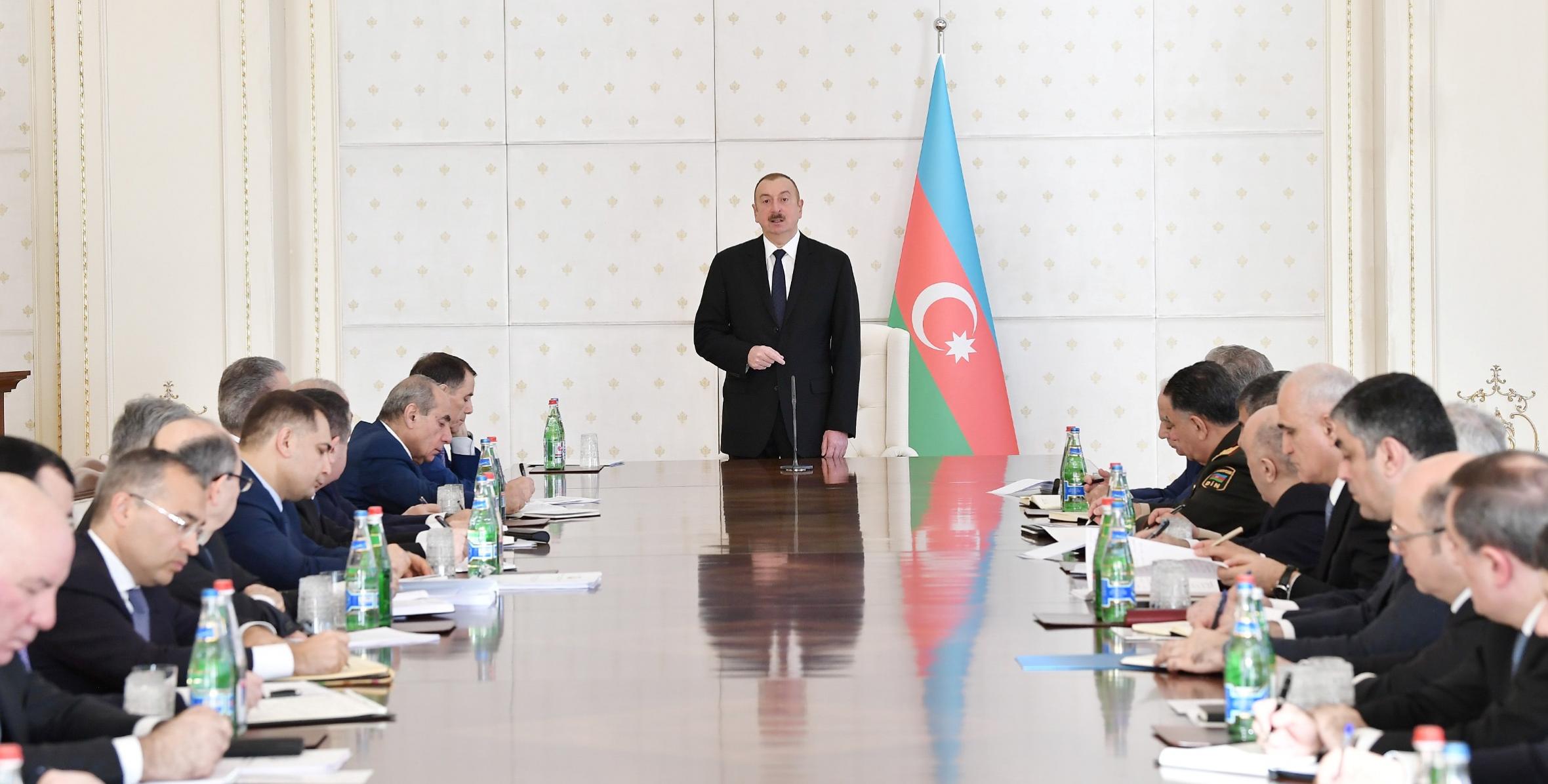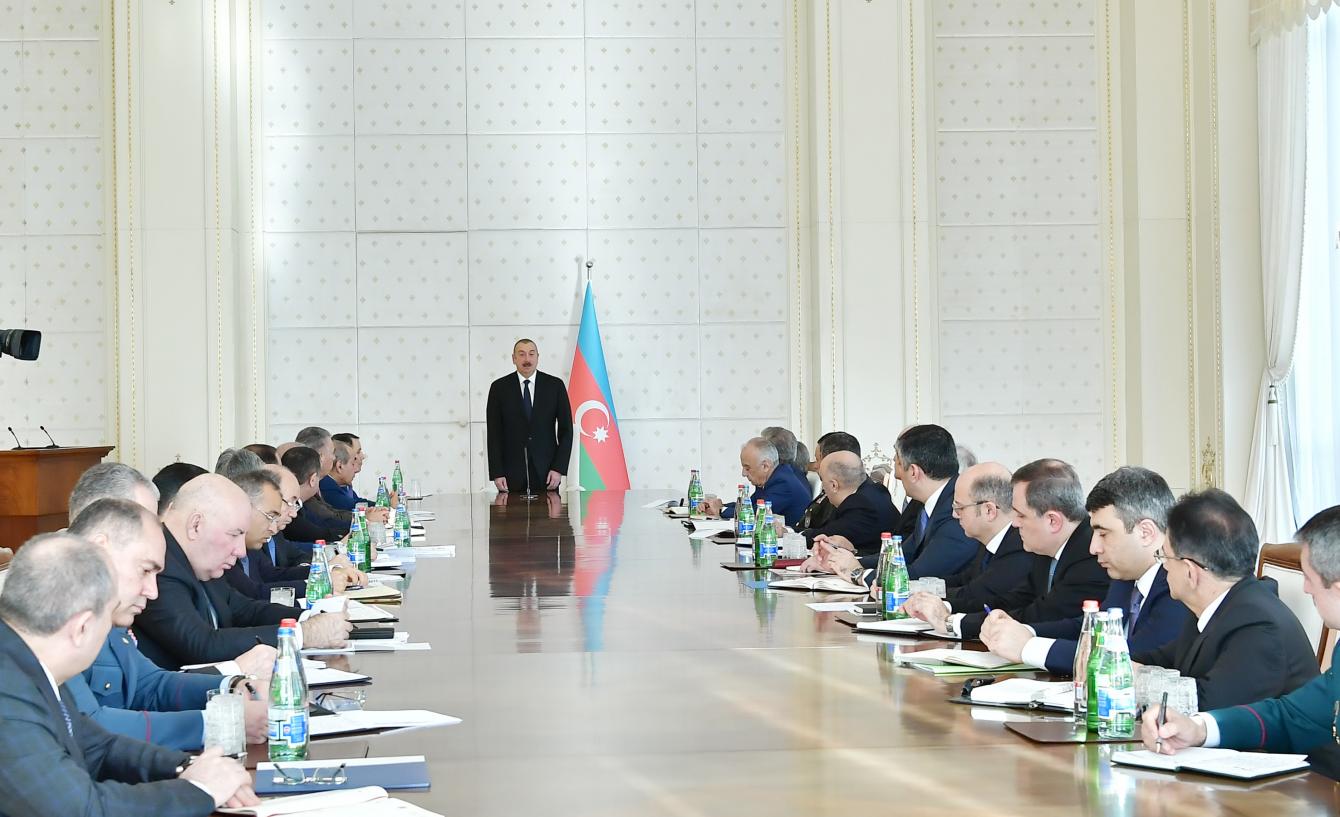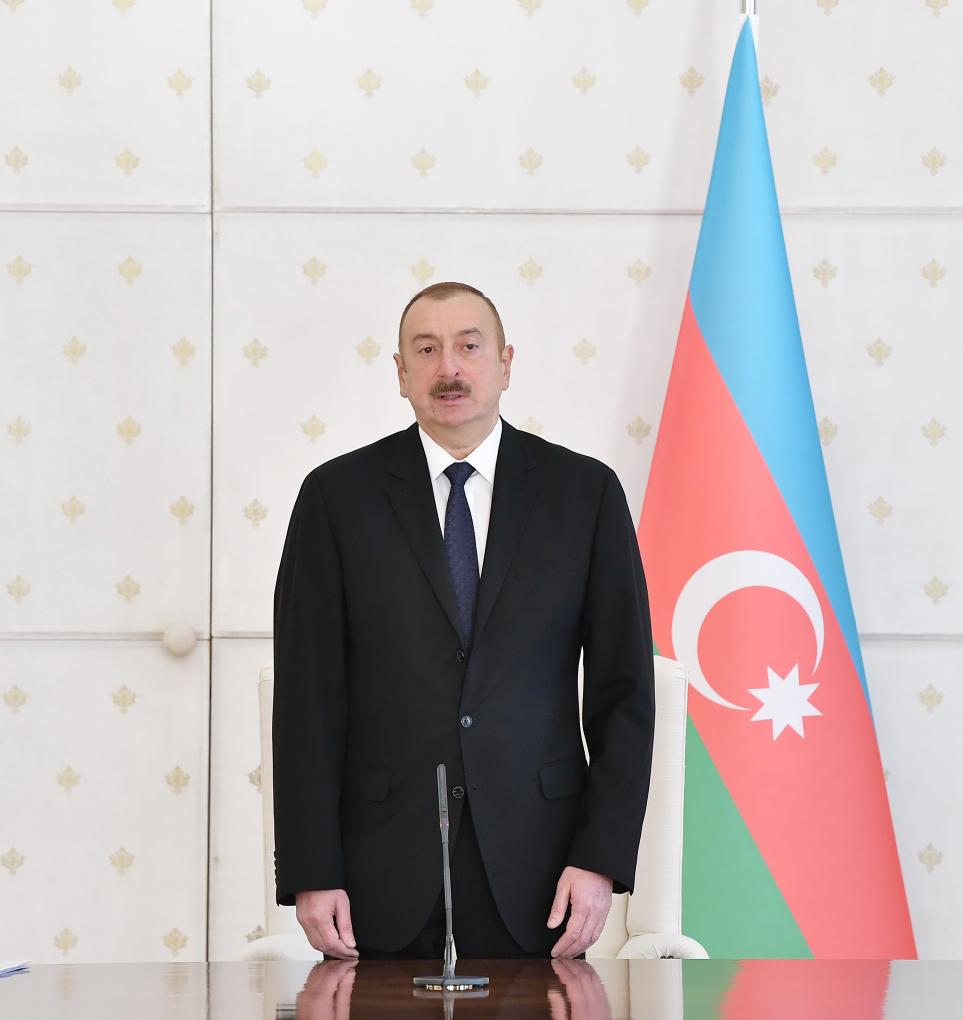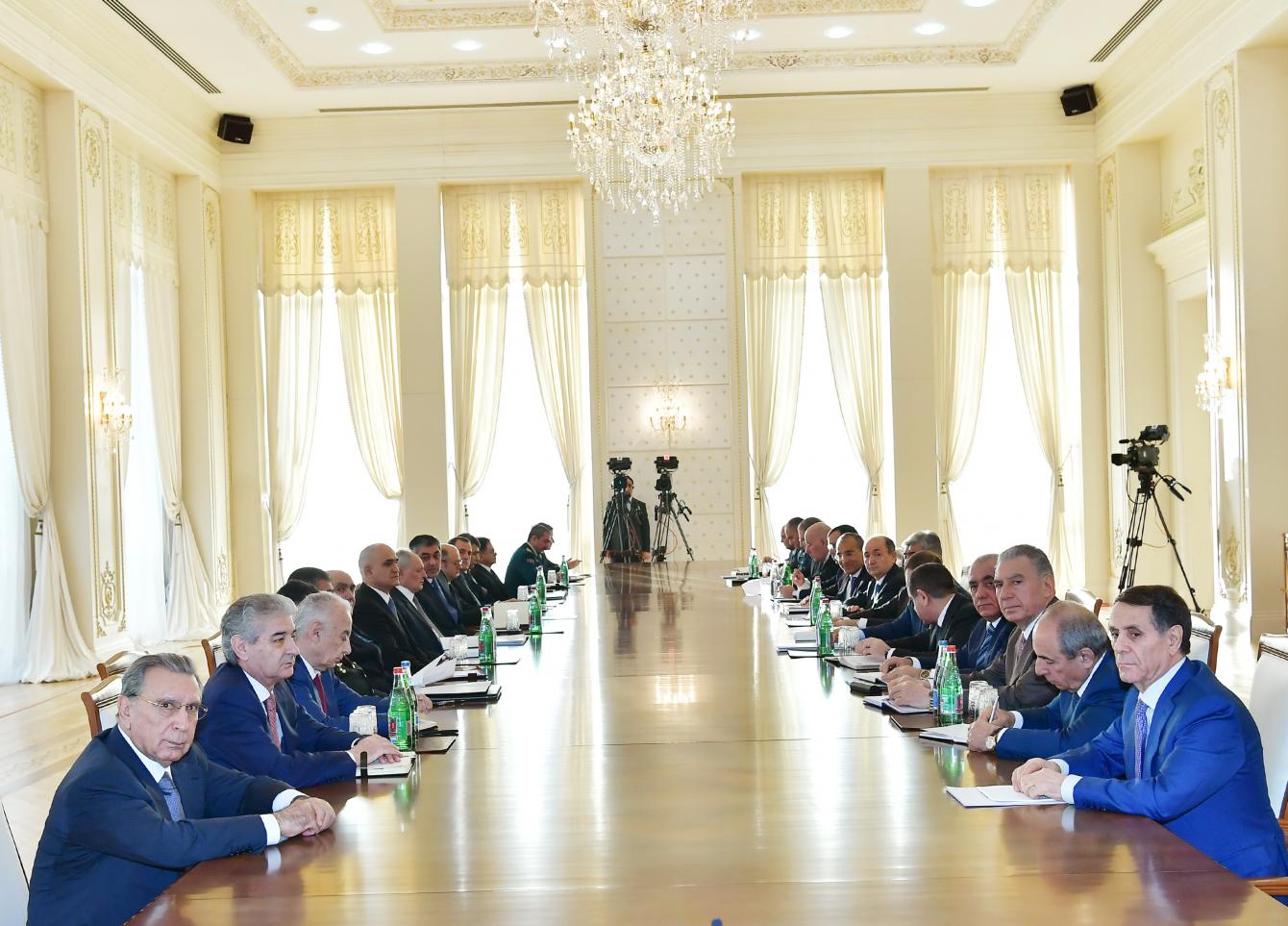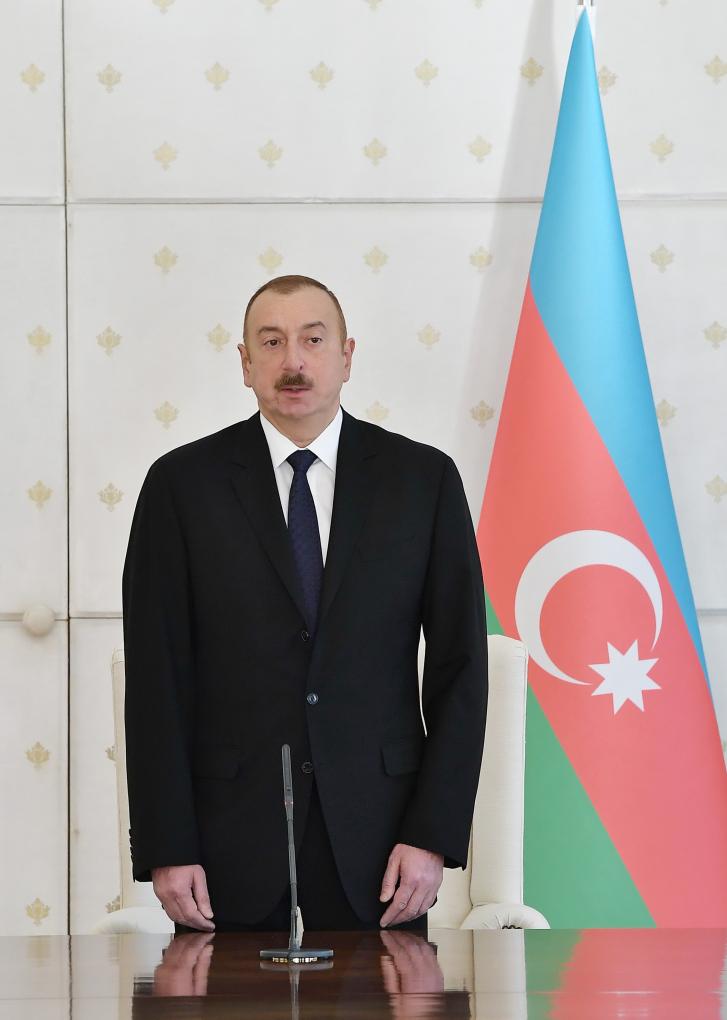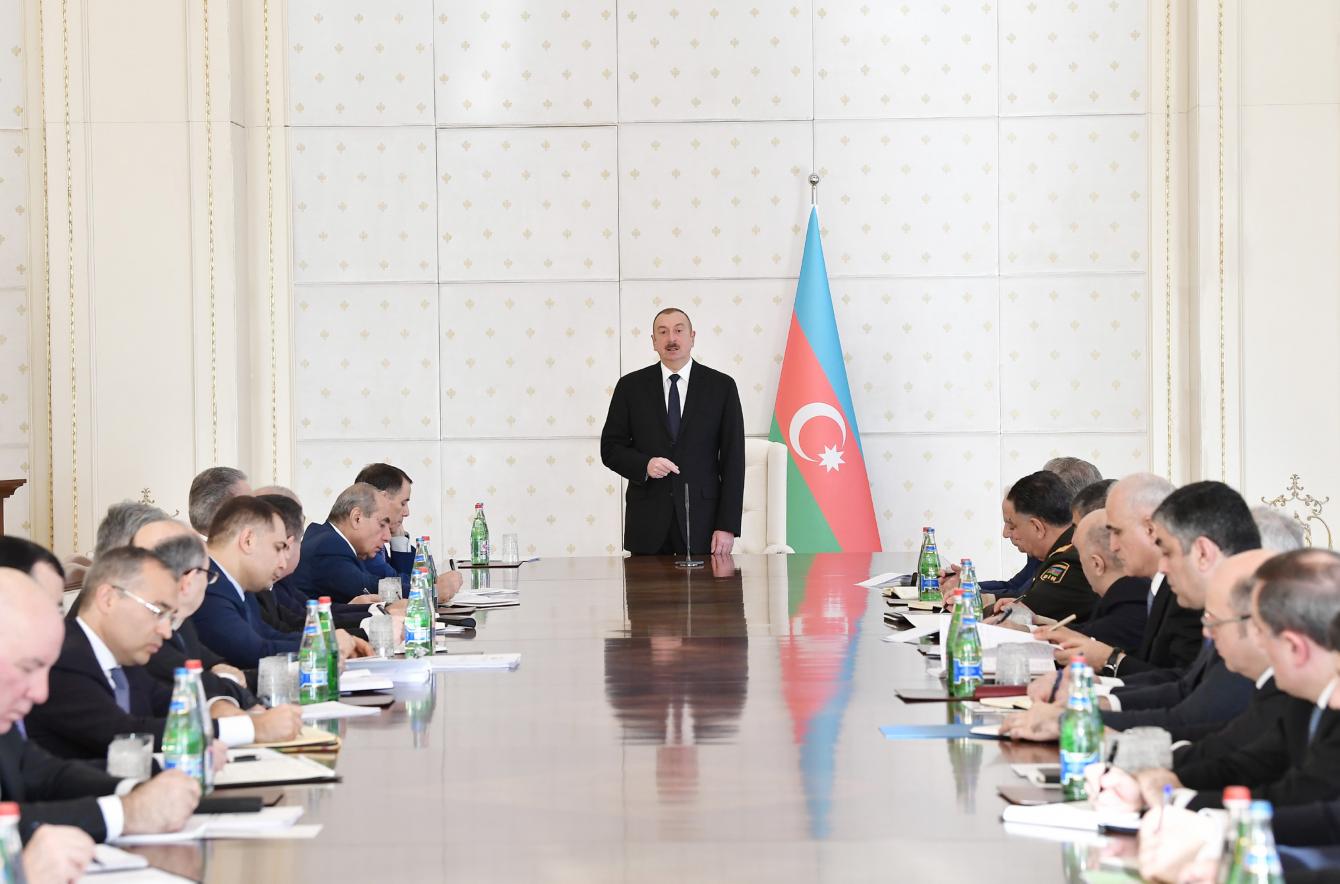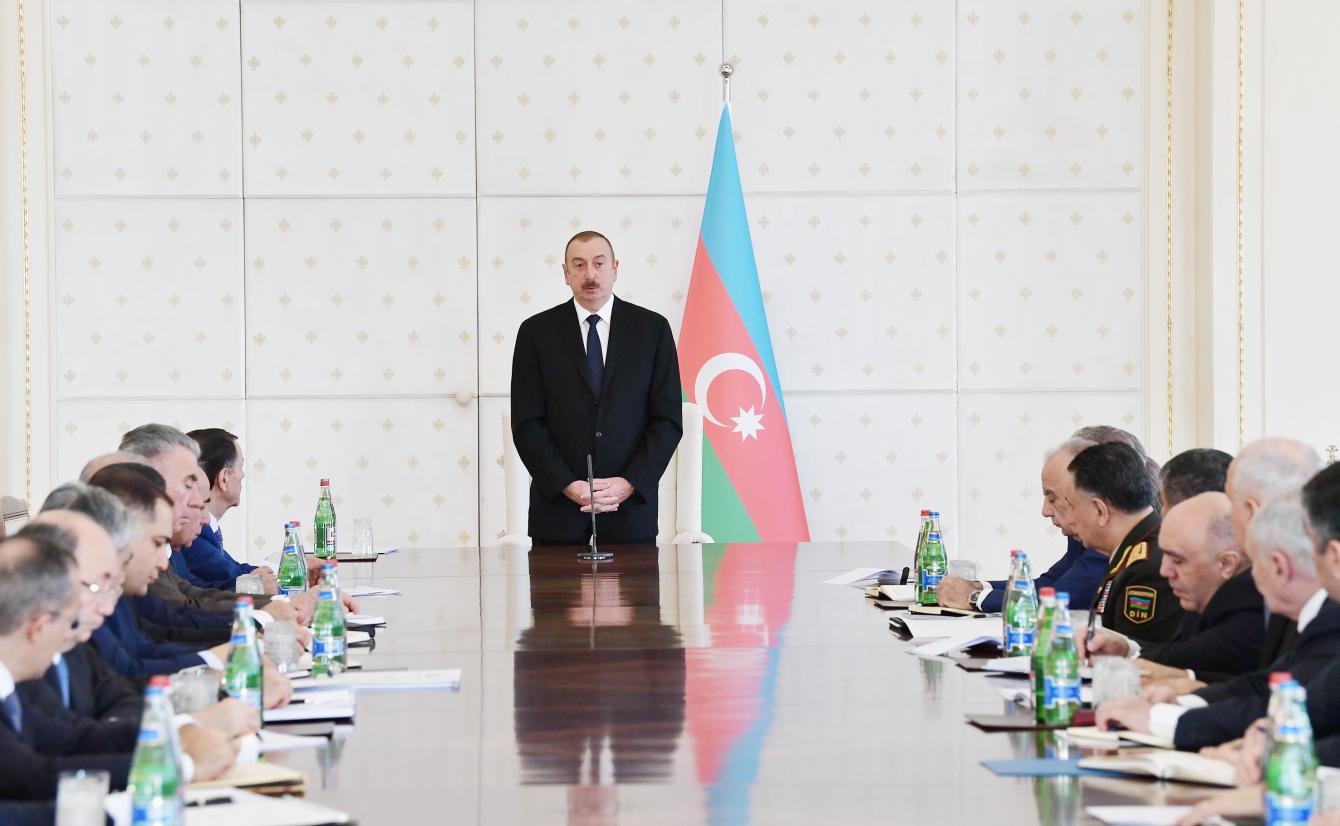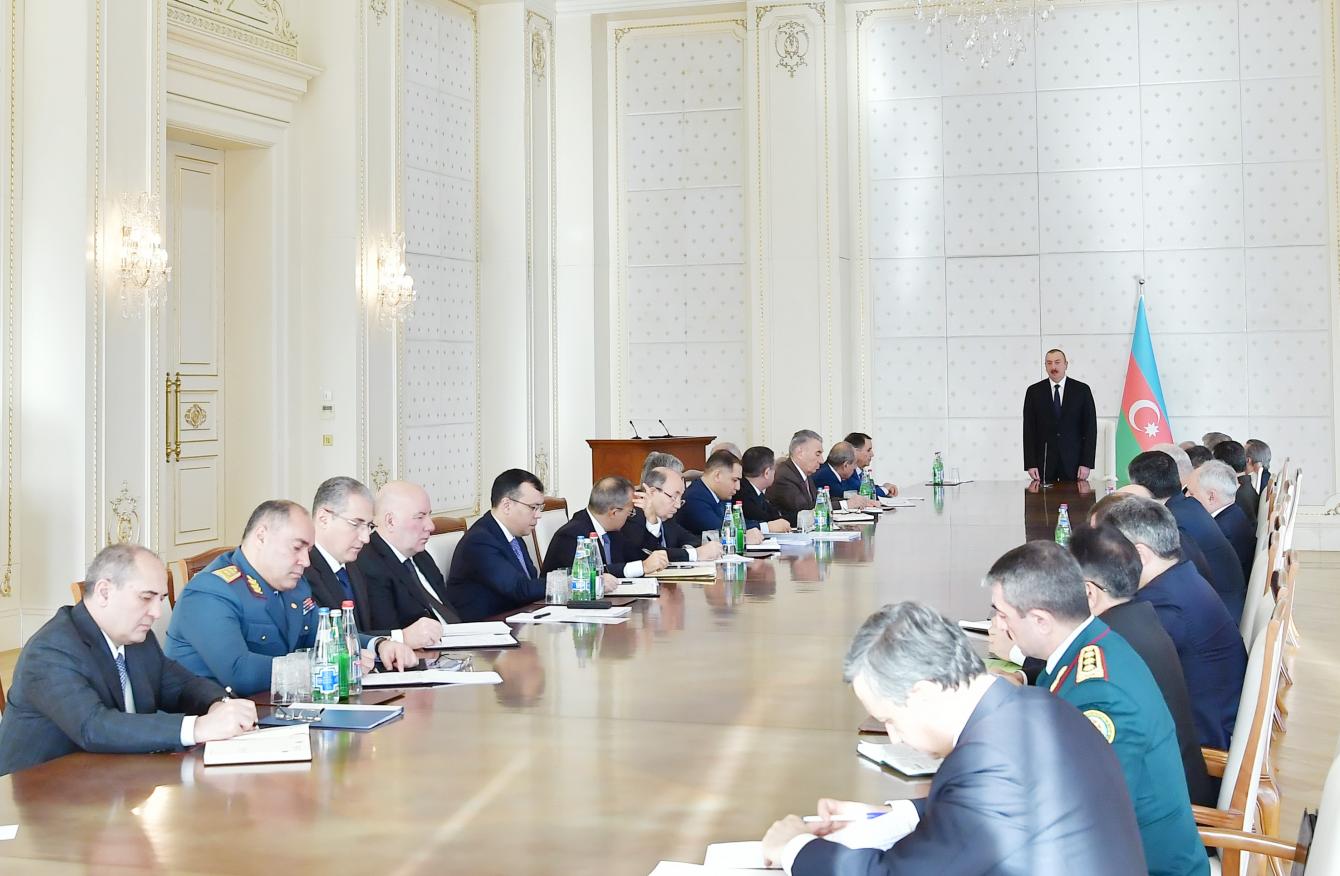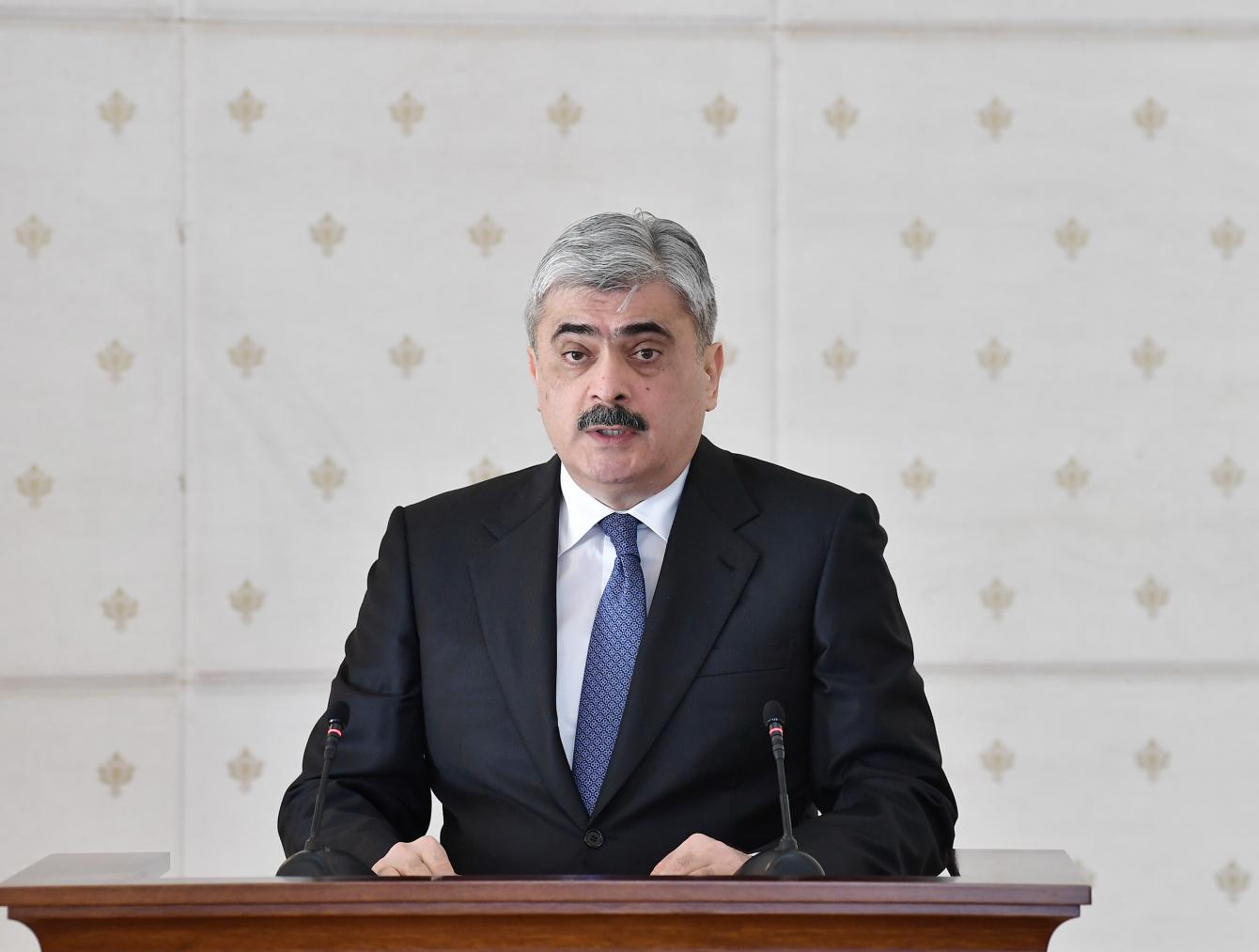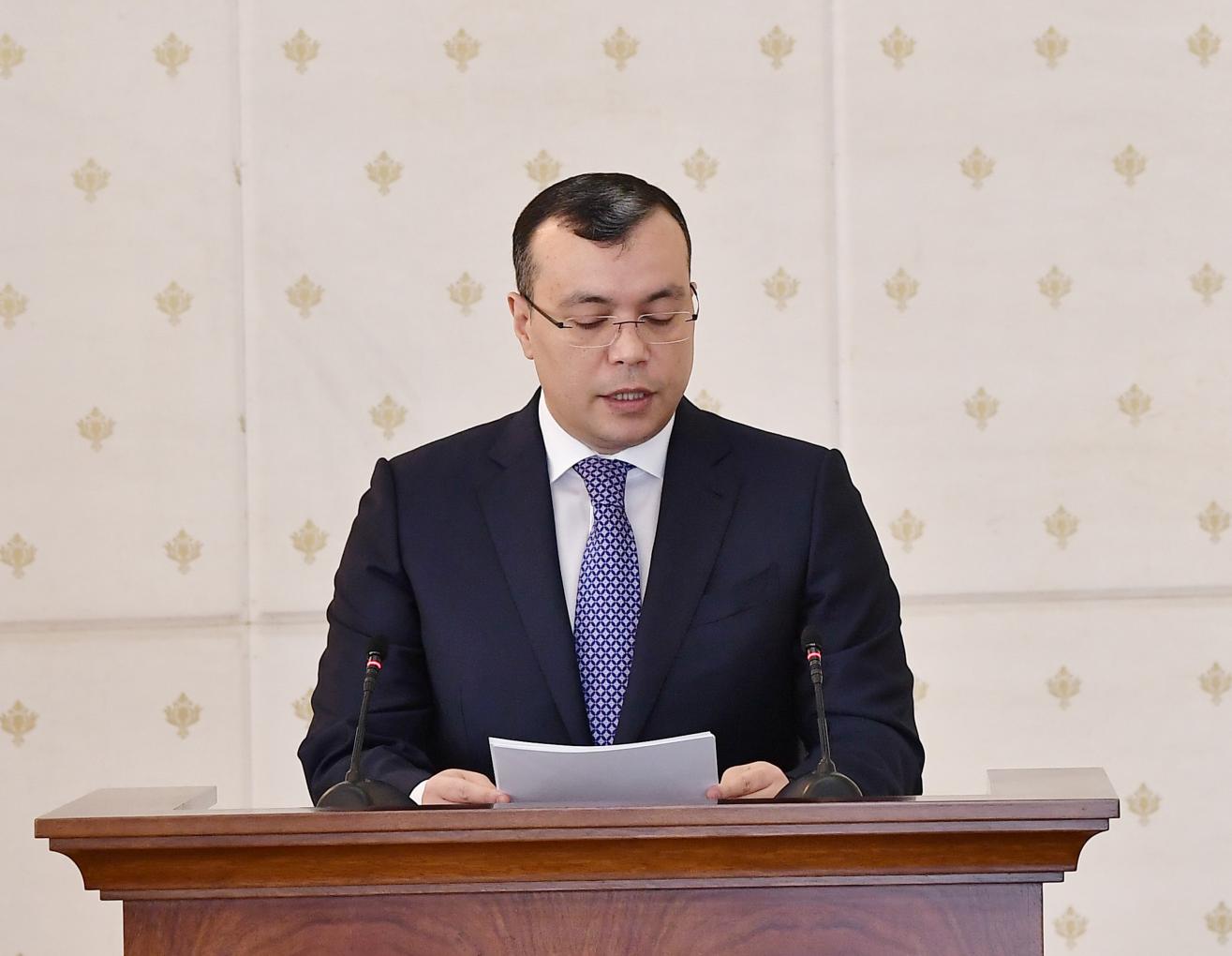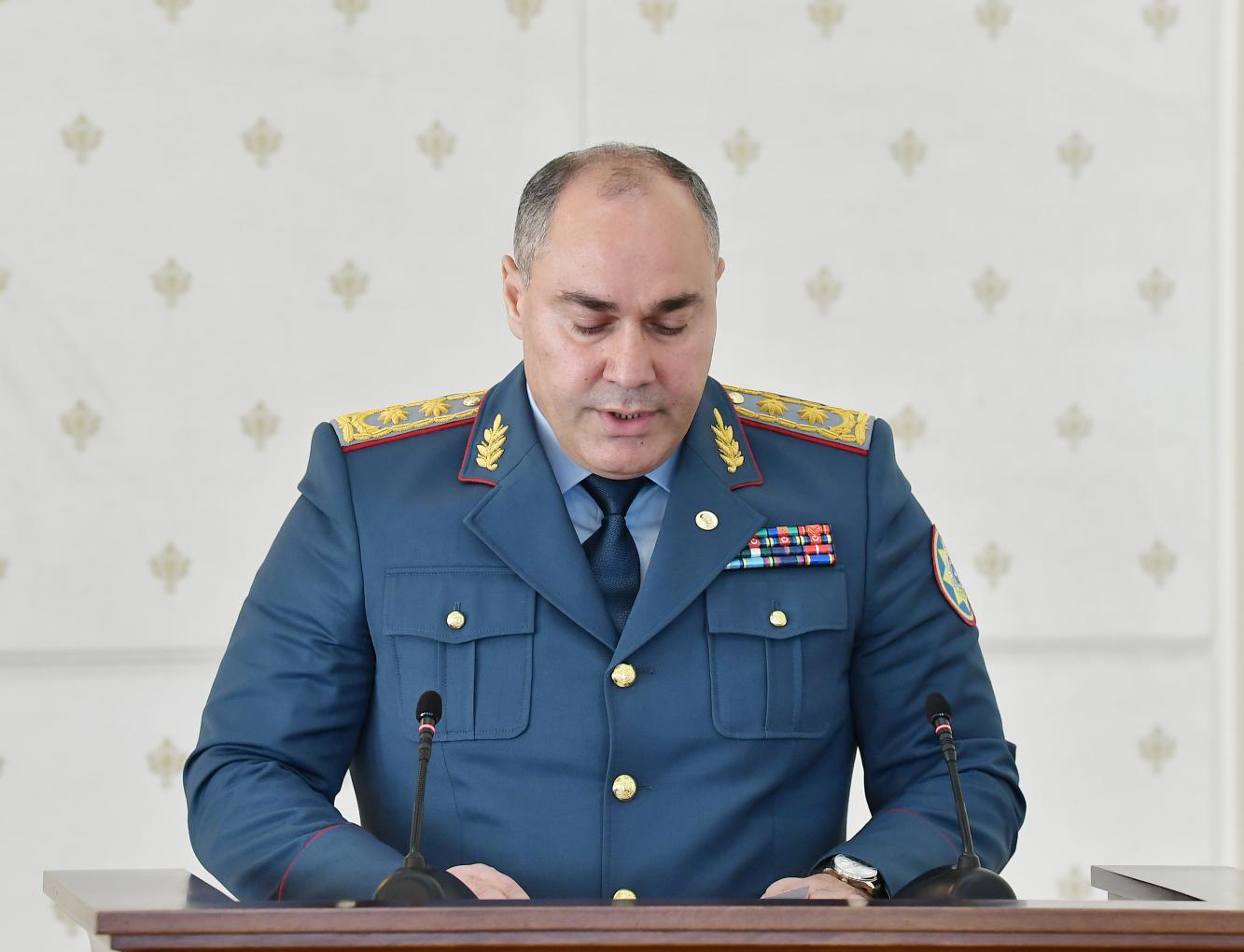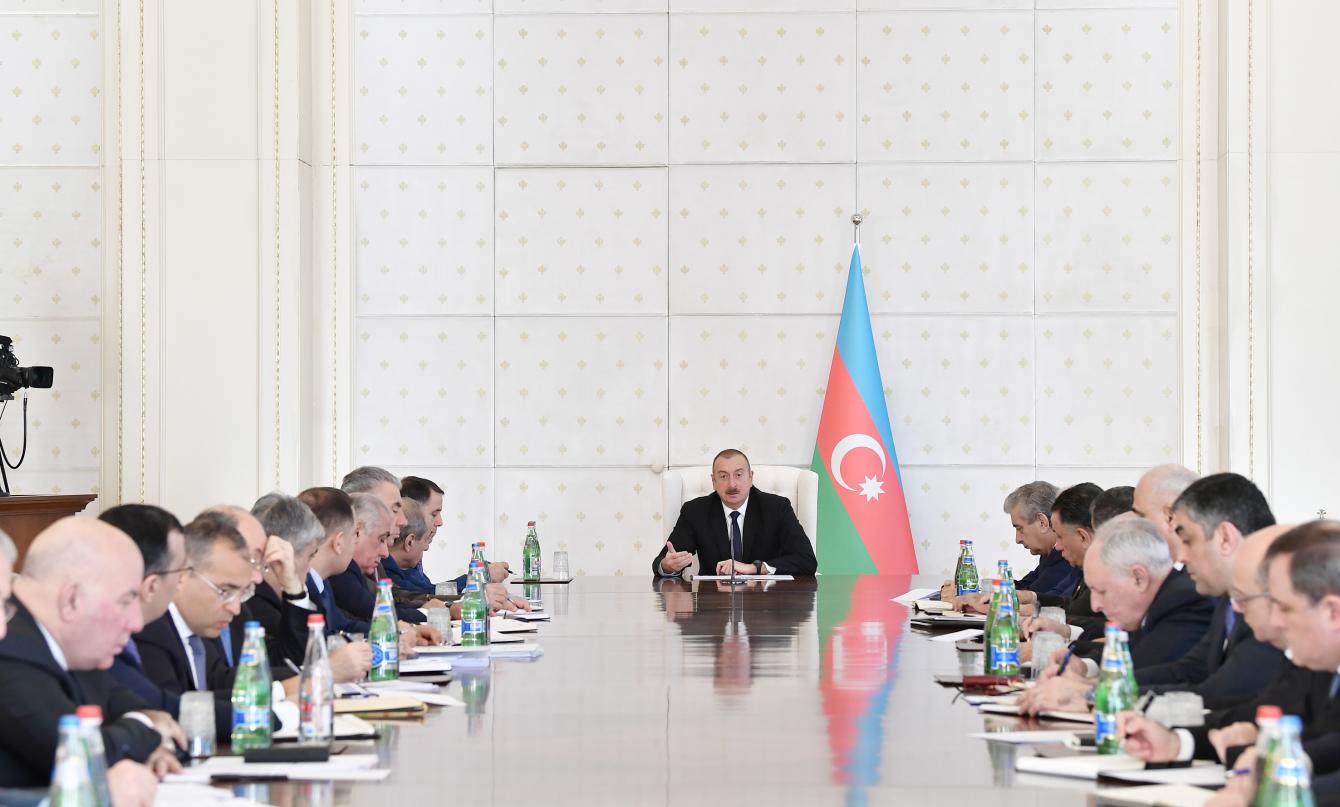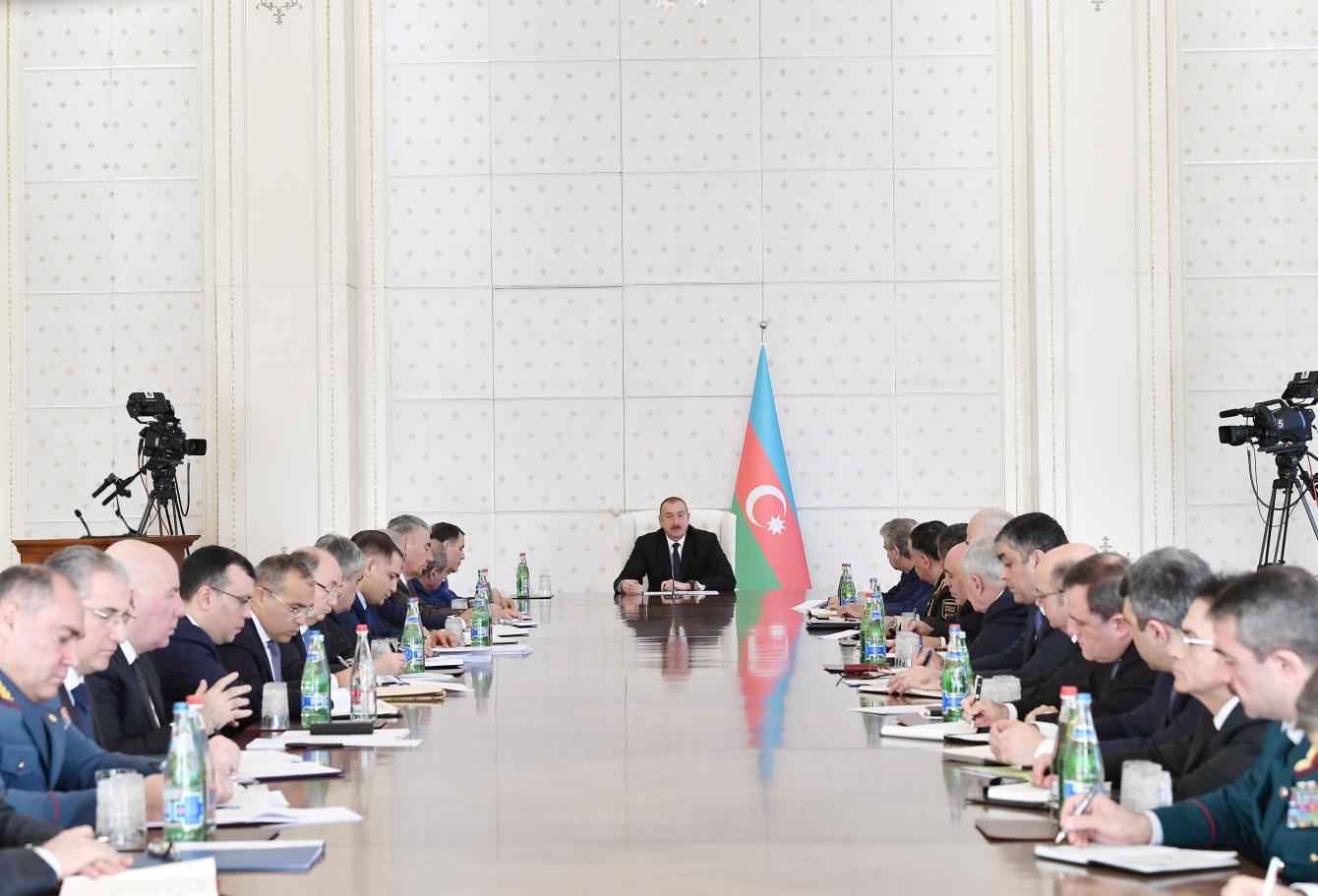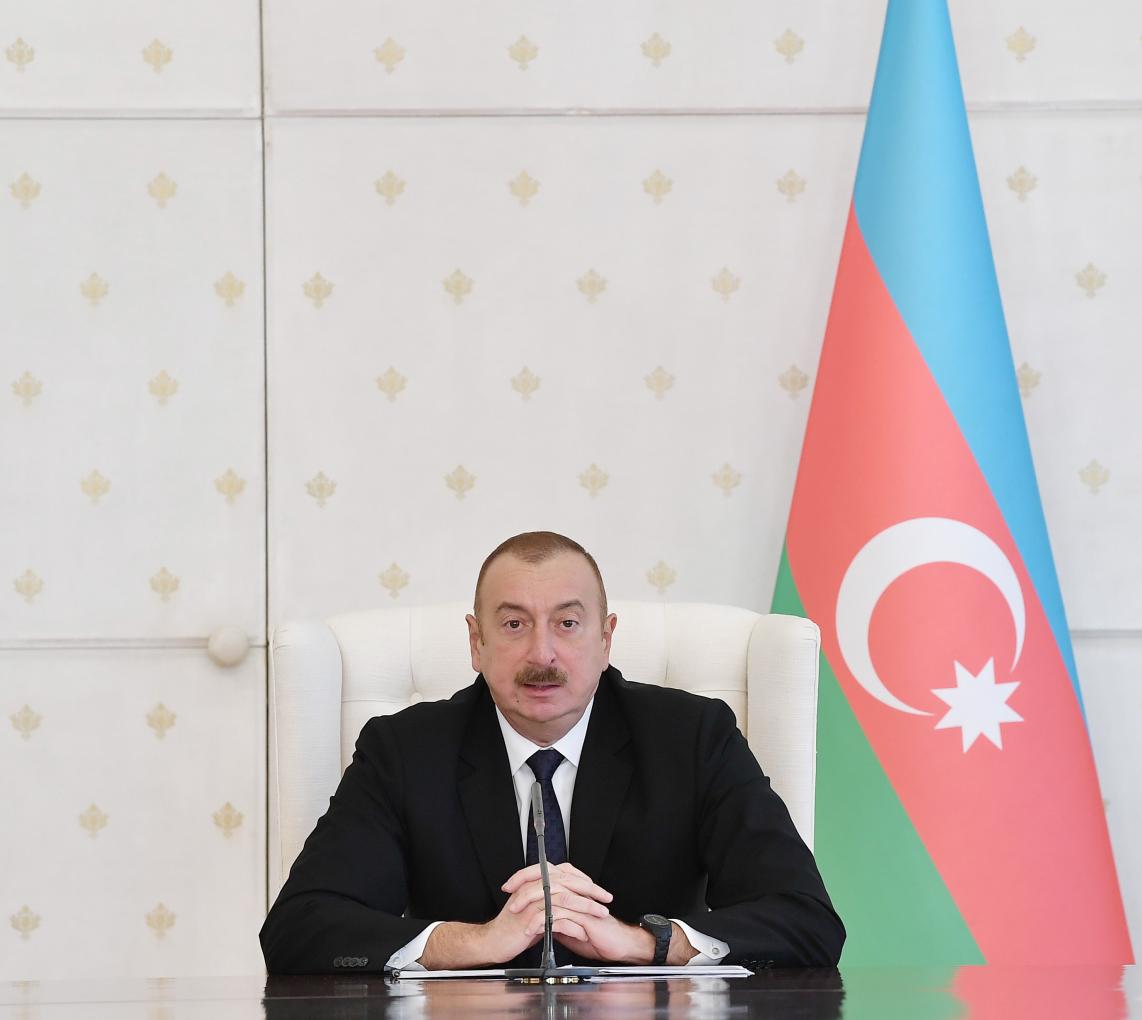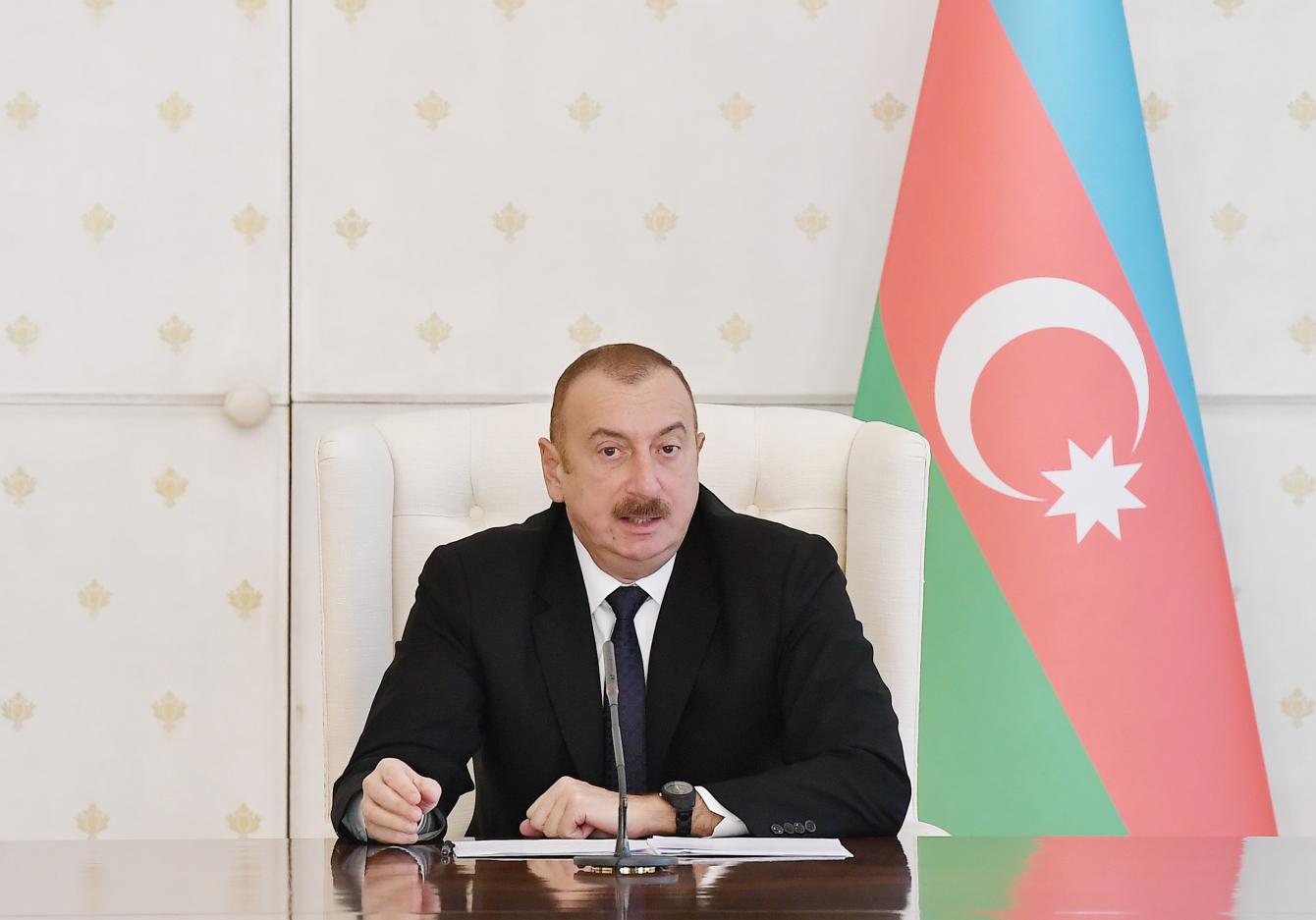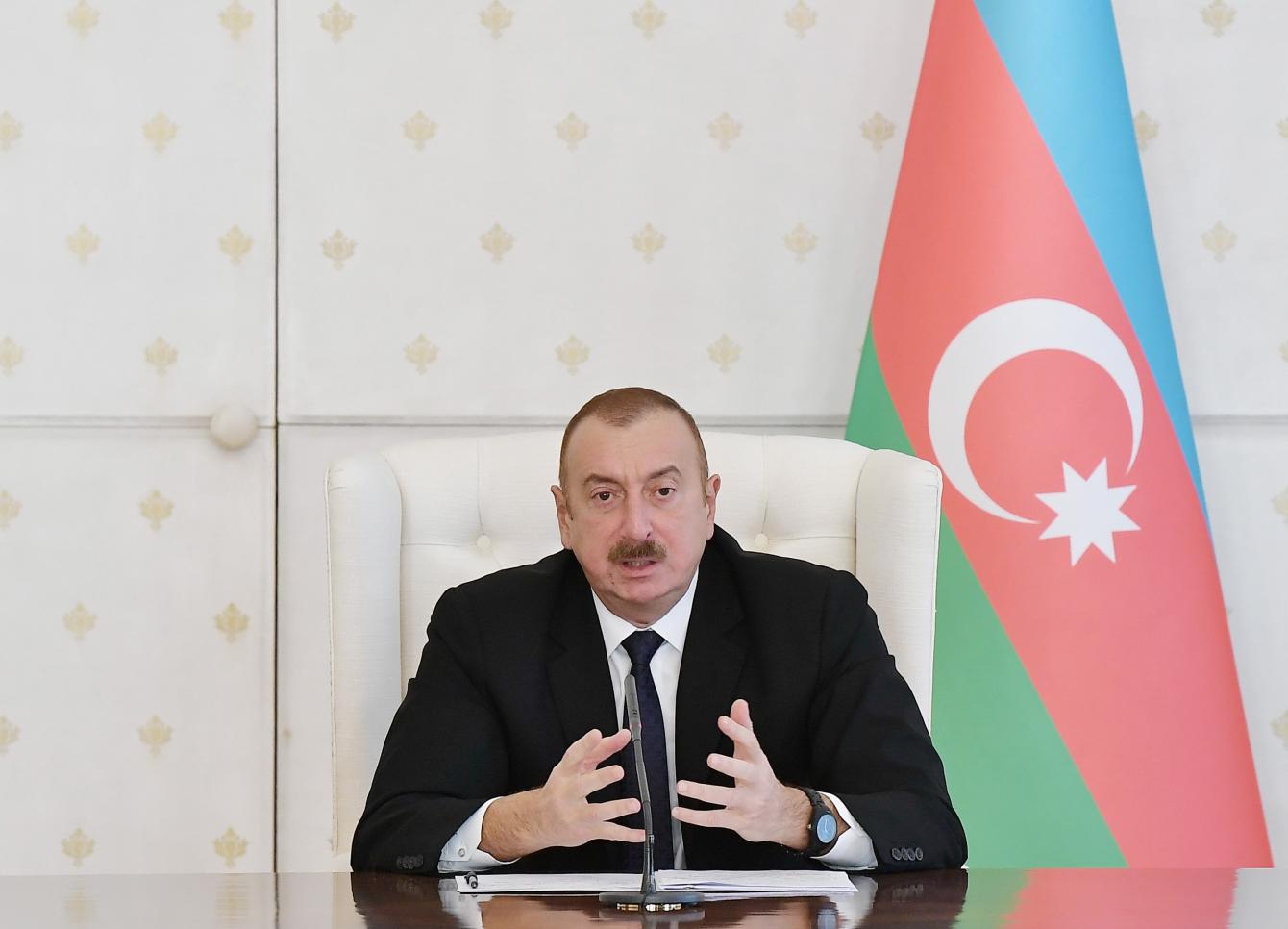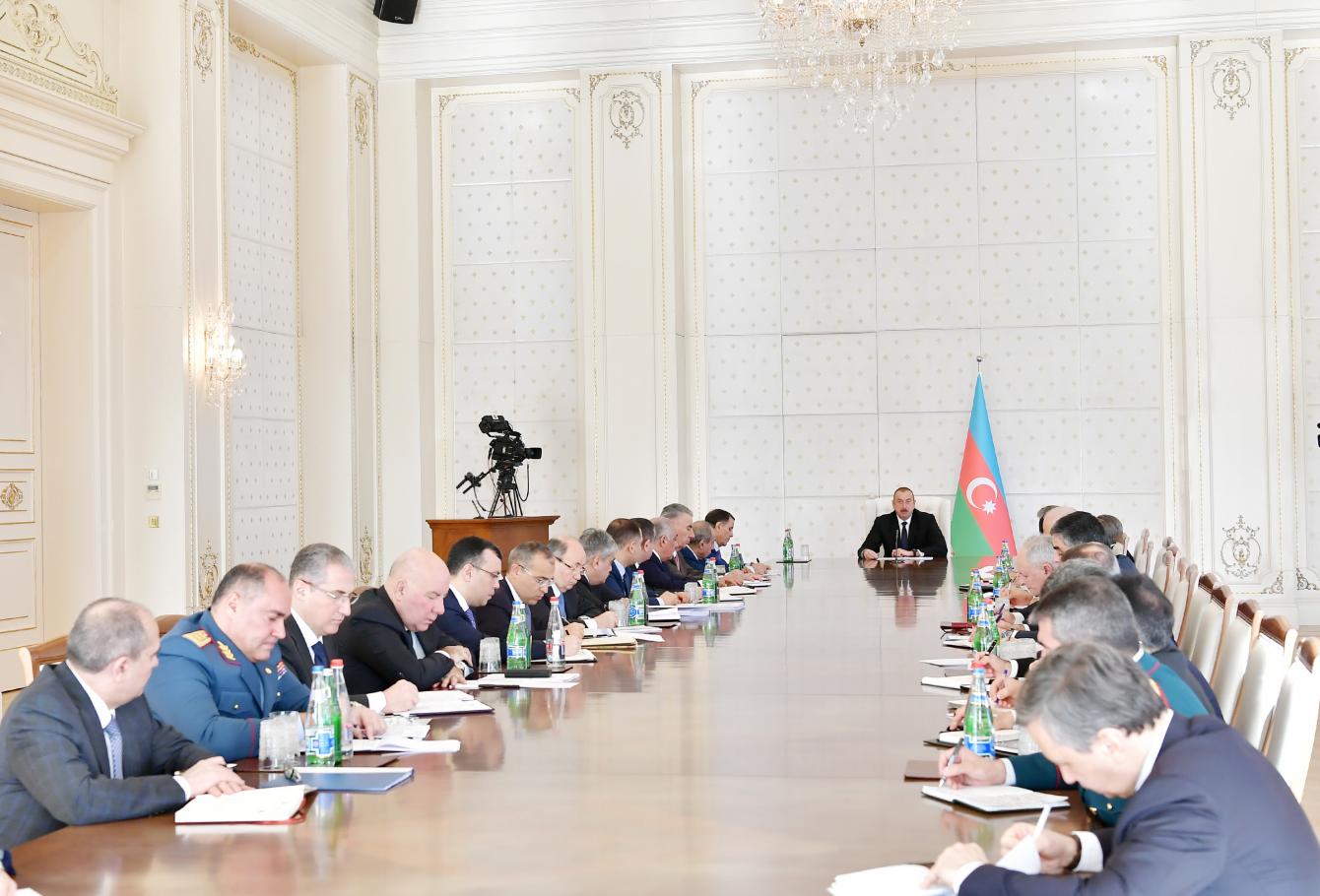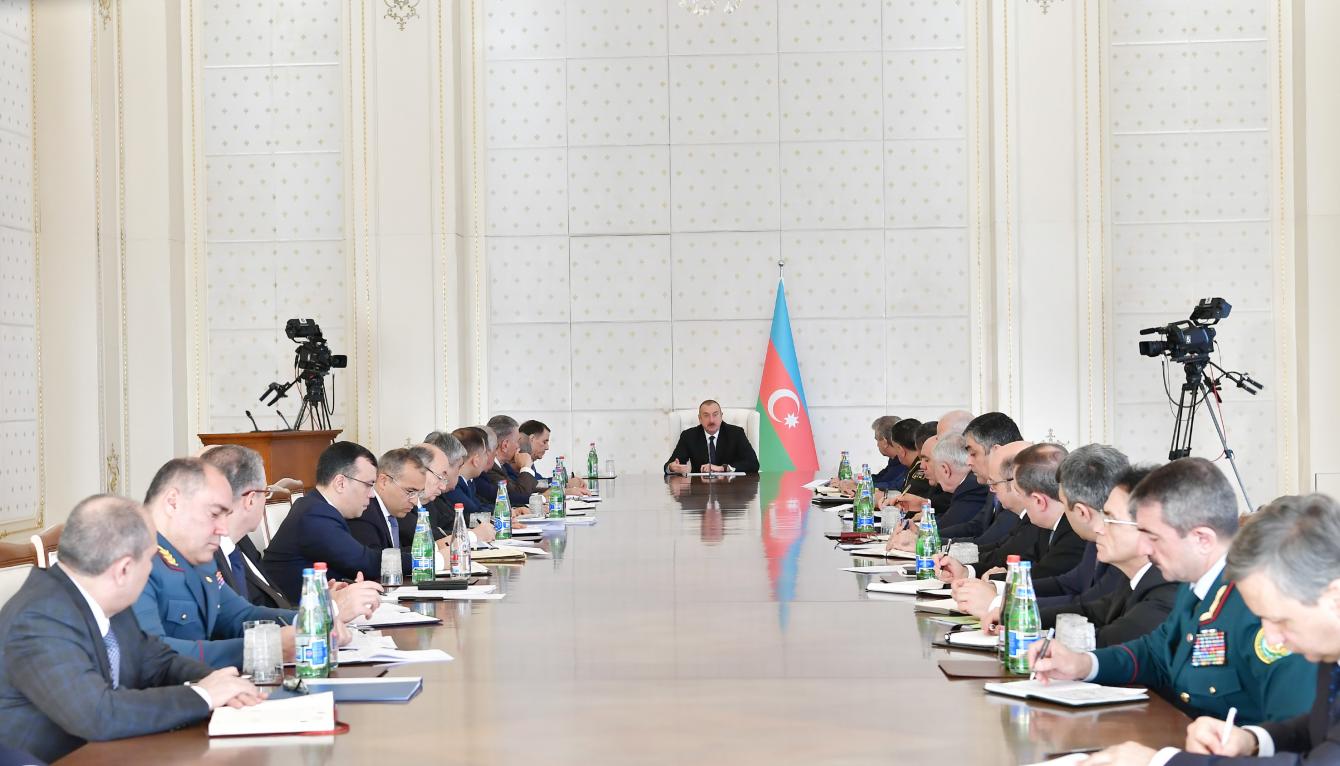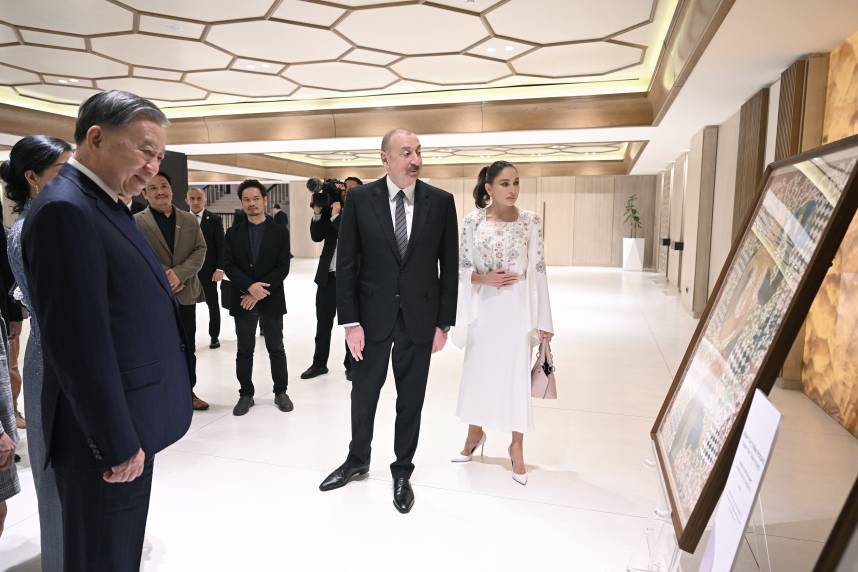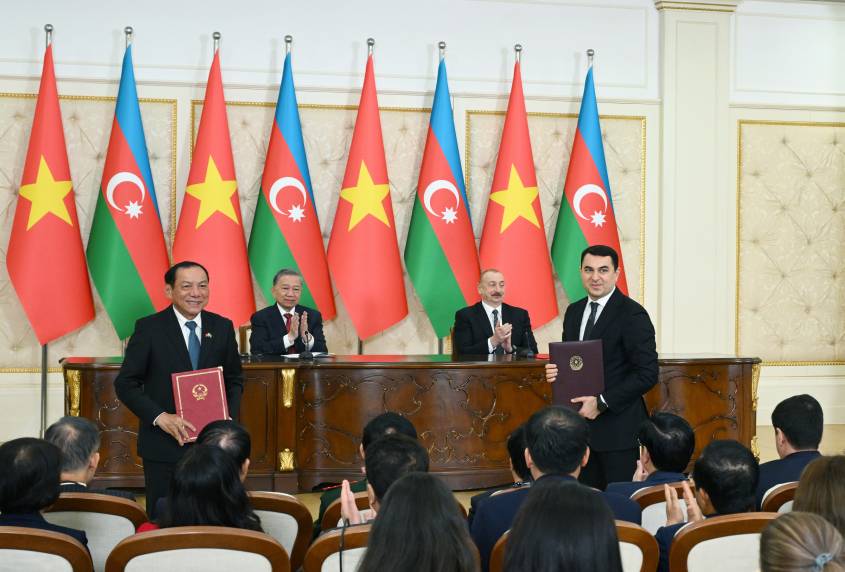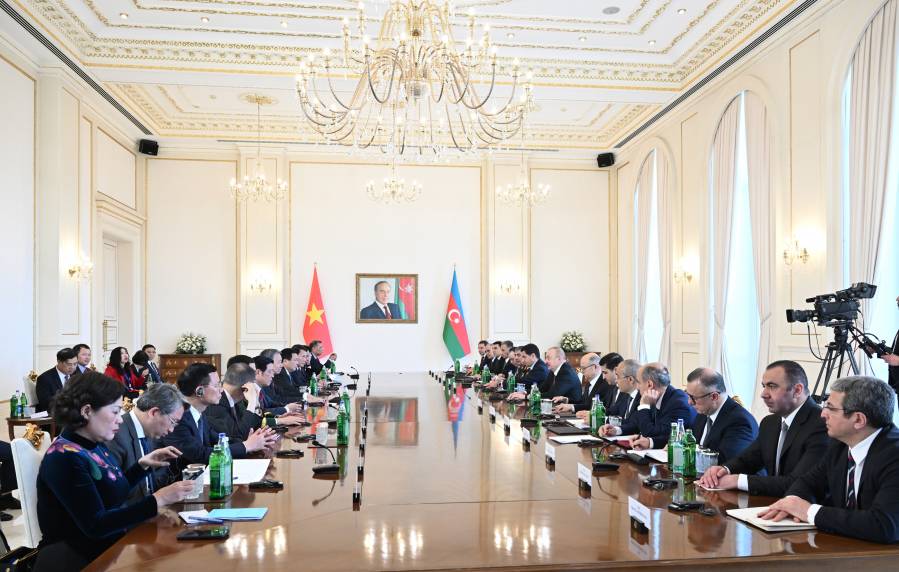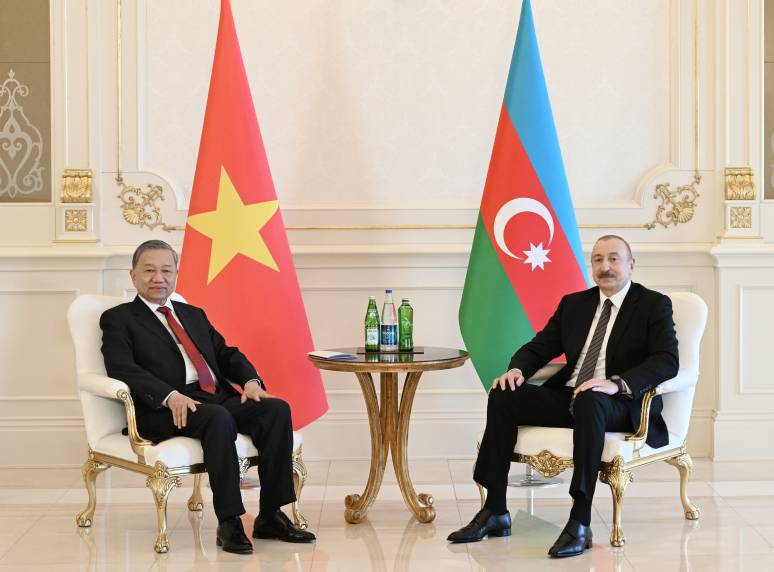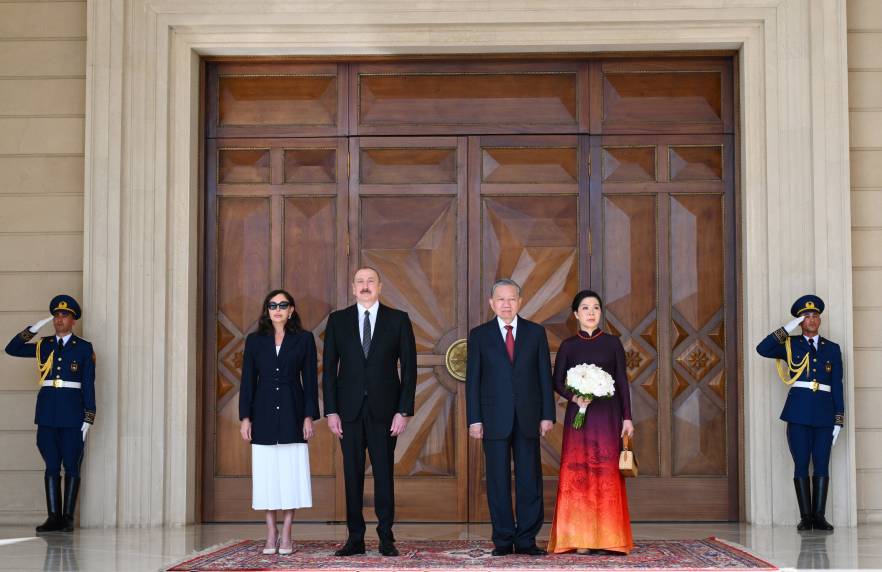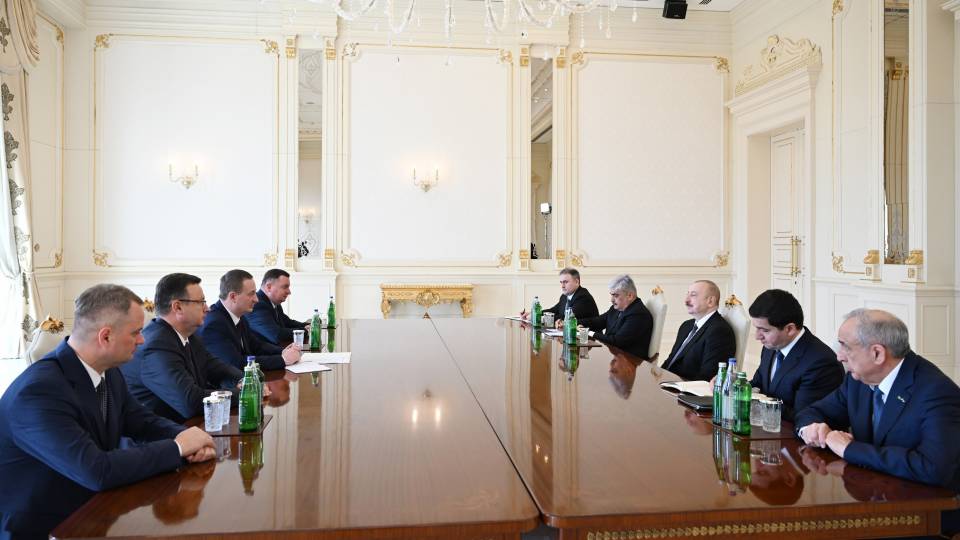President of the Republic of Azerbaijan Ilham Aliyev has chaired the meeting of the Cabinet of Ministers dedicated to the results of socioeconomic development of 2018 and objectives for the future.
The head of state made an opening speech at the event.
Opening speech of President Ilham Aliyev
- At today’s meeting of the Cabinet of Ministers, we will discuss the key results of 2018, and also talk about the work to be done this year.
2018 was a successful year for our country. Regardless of the developments that unfolded in the world and in our region, Azerbaijan developed successfully and rapidly. All the tasks we set at the beginning of last year have been fulfilled and the full dynamic development of our country was ensured.
As you know, very negative processes occurred in various regions of the world, including ours, last year. New risks and threats are emerging. The conflicts and bloody clashes that started in previous years have continued, stability has been disturbed in many places, and protests have assumed large proportions. Against this negative background, Azerbaijan’s successes are seen even more clearly. Azerbaijan is a country of development, progress and stability. Regardless of the processes occurring in the world and in the region, Azerbaijan is successfully following the path of independence and will continue to do so in the years to come.
The third state program on the socioeconomic development of the regions was completed last year. This five-year program has been exceeded. It has allowed us the opportunity to achieve rapid implementation of infrastructure projects in the regions, creation of hundreds of thousands of jobs, new industrial enterprises and more dynamic development of agriculture. In short, the regional development program is of great importance and has produced excellent results. This year we will adopt the fourth state program on the socioeconomic development of the regions. Most of it is almost ready.
Last year, I visited the regions of Azerbaijan 24 times. During these trips, I have the opportunity to exercise control over the work being done and, through meetings with local residents on the ground, give additional instructions to resolve their problems. Many orders have been signed relating to the improvement of the socioeconomic situation of the districts, including infrastructure projects. These orders go down quite well in our regions and lead to great results. As I have already mentioned, my visits to the regions create an excellent opportunity to be in touch with the people, monitor the work being done and take the right steps related to the work ahead. I have repeatedly visited every region of Azerbaijan – at least five times in every district. There are regions which I have visited more than 10 times, and these regular trips are of great importance.
In general, the domestic situation in our country – both in connection with public and political and socioeconomic issues – is stable. In other words, I can say that 2018 was not particularly different from previous years and our country was on the path of dynamic development.
I also believe that last year was successful for us in terms of the foreign policy. Last year I paid 16 foreign visits and 16 heads of state and government visited Azerbaijan. This shows once again that we have a multi-vector foreign policy, and the number of countries cooperating with us is growing every day. Of course, I believe that we have, first of all, managed to raise the level of our communication with neighbors to a higher level. Last year, I had numerous meetings with heads of state and government of neighboring countries, during which we resolved specific issues. Good relations with neighbors is a very important factor for any country. Azerbaijan is one of the countries that managed to establish excellent relations with all its neighbors except for Armenia by pursuing a thought-out policy, and we benefit from these relations. Both the development of regional security and the successful solution of transport, energy and trade issues depend, inter alia, on relations with neighbors. In a nutshell, our relations with neighboring countries are very positive, and I am sure that further steps will be taken in this direction this year too.
As you know, Azerbaijan has earned tremendous respect and authority in the Muslim world. The steps we have taken in relation to Islamic solidarity are highly appreciated by the Organization of Islamic Cooperation, as well as by many Muslim countries, and our contribution to this area is quite sizable. In other words, our policy strengthens solidarity and cooperation in the Muslim world. The measures we have taken in this direction – both domestically and abroad – have further strengthened Islamic unity. It is no coincidence that Nakhchivan was elected the Capital of Islamic Culture last year. Nakhchivan city carried this honorary title very successfully. We will develop our relations with Muslim countries in various directions this year too, so our authority, reputation and role in the Muslim world will further increase.
As you know, an important document was signed between the European Union and Azerbaijan last year. It is called “Partnership Priorities”. This document covers many issues. I should emphasize that issues related to the Armenia-Azerbaijan Nagorno-Karabakh conflict are becoming rather positive. The document expresses support and respect for the territorial integrity and sovereignty of Azerbaijan and the inviolability of our borders. I believe that this document has a special place in the work we carried out in this direction in recent years. Thus, the European Union has unequivocally demonstrated its opinion on ways of settling the Armenia-Azerbaijan Nagorno-Karabakh conflict. At the same time, the final declaration adopted at the NATO Summit last year also expressed support and respect for the territorial integrity of Azerbaijan.
Last year, we held a large conference at the level of foreign ministers of the Non-Aligned Movement in Baku. As you know, a Summit of the Non-Aligned Movement will be held in Baku this year, and Azerbaijan will chair this major organization. Of course, chairmanship in the second biggest organization after the UN will further enhance our authority and, at the same time, have a positive impact on the settlement of the Armenia-Azerbaijan Nagorno-Karabakh conflict.
One of the important issues of our foreign policy was the determination of the legal status of the Caspian Sea. The signed Convention is of great importance for the resolution of this issue. We are glad that the position we have defended over the years is fully reflected in this Convention. The signing of this document shows again that the Caspian Sea is a sea of peace, cooperation and security. The convention is very important. I consider the signing of this document to be a great diplomatic and political success of all Caspian littoral countries.
As for the settlement of the Armenia-Azerbaijan Nagorno-Karabakh conflict, our position remains unchanged. This issue must be resolved only within the framework of the territorial integrity of our country. The resolutions of the UN Security Council must be implemented and Armenian armed forces must unconditionally withdraw from our occupied lands. These very expressions are contained in resolutions of the UN Security Council. The process of continuing the negotiations has begun despite the fact that the new leadership of Armenia tried to evade them at the initial stage. There were even thoughts that Azerbaijan should conduct negotiations with the self-styled “Nagorno-Karabakh republic”. We immediately rejected such attempts. Of course, the mediators dealing with the conflict also could not support such an incomprehensible approach and expressed their opinion. The process of negotiations was eventually restored. Several meetings of foreign ministers have already taken place, and negotiations are being held between Armenia and Azerbaijan. Only this format of negotiations is acceptable.
As you know, major changes took place in Armenia last year. The regime of the criminal junta that had illegally usurped power for over 20 years fell. And this was natural. This is a logical and bitter end of the criminal regime. An important role in this issue, of course, is played by Armenia’s aggressive policy. It is because of this policy that we have isolated Armenia from all regional projects. It is because of this occupying policy that Armenia’s economy has practically collapsed. Armenia is experiencing a profound demographic crisis. The process of depopulation, i.e. reduction of the population, has become widespread. Azerbaijan has proved to the world that its policy is correct. I have never concealed this policy and explicitly declared from various platforms that we will use all available means to isolate Armenia until our lands are liberated. This policy has yielded results, the criminal regime has collapsed and a new situation has arisen in Armenia.
We have repeatedly said that the regime of criminal and bloodthirsty junta has dominated Armenia for 20 years. Unfortunately, certain international organizations have turned a blind eye to this. The question may be asked now: how can it be possible that international organizations gave positive assessments to the presidential and parliamentary elections held in Armenia with major falsifications in recent years? After all, the latest parliamentary elections showed that a group of people that had illegally seized power could not even get 5 percent of the vote. This is recognized by everyone. Why didn’t anyone condemn the criminal regime, which ascribed more than 50 percent of the votes to itself in previous years?! Why did the Council of Europe, the European Parliament and other international organizations ranting about democracy and justice turn a blind eye to this shameful picture?! Didn’t they know that all elections in Armenia were rigged? Didn’t they know that the Armenian people hated the criminal regime? They knew that perfectly well, but turned a blind eye to that. Why? Because of double standards. What for? It is likely that there were other issues related to their selfish goals. It is no secret for anyone that Armenia activated its “cognac diplomacy” in the international arena and bribed many politicians. In previous years, the factor of bribe was in the first place in Armenia’s foreign policy.
Therefore, I believe that this issue should be seriously investigated by relevant international bodies, and the “politicians” who supported the criminal regime for 20 years, turned a blind eye to its crimes and received orders and medals from it, must be brought to justice. Our demand is precisely this. If this does not happen, it means there are no changes. If this is not done, then the ridiculous statements by certain international organizations regarding justice and human rights will remain just ridiculous statements. If international organizations that supported the Sargsyan regime and its deeds, and turned a blind eye to them want to wash away their sins, they must admit that they were in agreement with criminals for 20 years, which means that they have contributed to these crimes too.
I have repeatedly said that Armenia is ruled by a criminal regime. The Armenian people are saying this today. Their former leaders are criminals and this is a proven fact. Their heroes are cowards and their generals are thieves. This is the current situation in Armenia. If a country which gained independence only 27 years ago is led by criminals for 20 years, then it is not too difficult to form an idea about this country.
I have repeatedly said this and I want to say it again that there is one way for Armenia to come out of this difficult crisis – to normalize relations with Azerbaijan. We are ready for this. But, of course, there is one condition – Armenian armed forces must withdraw from our occupied lands.
At the same time, of course, we paid great attention to our military potential last year, and there are impressive achievements in this area. The combat capability of our army is growing, and the Nakhchivan operation clearly confirmed this. As a result of the successful Nakhchivan operation, we now fully control 11,000 hectares of land. It was a very successful operation. At the same time, the occupied heights are of strategic importance. They allow us the opportunity to exercise full control over the road connecting Armenia with Nagorno-Karabakh. So this event, the Nakhchivan operation, shows again that the Azerbaijani people and the state will never put up with this occupation and will restore their territorial integrity by all means. There is simply hope for negotiations, this is why we still believe that the path of negotiations is the main remedy. At the same time, we are building up our military power. The work done to bolster our combat capability last year certainly deserves a very high assessment. The servicemen who distinguished themselves in the successful Nakhchivan operation have received relevant state awards.
We did a great deal last year to strengthen the material and technical infrastructure of our army. During the two military parades, we demonstrated some of our military hardware. Among them, of course, I would like to highlight the “Polonez” and “LORA” long-range missile systems. The opposite side has no ability to protect itself from these systems. These systems can cover a distance of 300 kilometers or more and destroy any military target with high precision and great destructive power. Let me say again that there is not a single enemy military target that we cannot destroy with high precision.
The acquisition of these systems, of course, increases our military power. At the same time, our military power is multiplied by the acquisition last year of unmanned combat aircraft. Of course, the air defense and missile defense systems acquired in recent years have strengthened our defense capabilities, while other systems have increased our offensive power. Everybody knows that. The events taking place in the military sphere are no secret to anyone. The opposite side, the enemy also knows and should know that the Azerbaijani army is one of the strong armies on a global scale today, and additional steps will be taken in this direction this year.
The problems of our compatriots who suffered as a result of the war were successfully solved last year as well. Very serious steps have been taken in connection with this issue. Last year, more than 5,800 IDP families were provided with new houses and apartments. This is a record figure in recent years. Along with this, more than 620 apartments were provided to the families of the martyrs and those handicapped in the Karabakh war. Even more apartments will be provided this year, including new IDP settlements. In other words, this issue is always in the spotlight. To address the problem of the IDPs still living in difficult conditions, we have provided major funds this year as well. We will address these issues.
Of course, all this work requires economic power, and we are creating it. In terms of economic development, Azerbaijan today does not depend on anyone – on any international financial organization or country. Economic independence allows us the opportunity to pursue an independent policy and to protect the interests of the Azerbaijani people. Last year was successful for us in terms of economic development. I can say that last year was a year of profound economic reforms, and everyone sees their results now. State budget revenues have significantly increased. The main goal of economic reforms is to fully ensure transparency in this area, step up the fight against negative phenomena and thus accelerate the successful development of our country. I can say that international organizations and leading financial institutions are following the processes occurring in Azerbaijan with great interest and giving a high assessment to our work. I should note that the World Bank’s “Doing Business” report ranks Azerbaijan in 25th place globally. In a matter of one year, we have advanced 32 steps. I think this is a record figure. To be in 25th place on a global scale in terms of doing business conditions is a great achievement.
All our economic indicators are very positive. I want to bring some indicators to the attention of our people. Last year, the gross domestic product, or the rate of economic growth in Azerbaijan, constituted 1.4 percent. I think this is a good indicator. Of course, it does not fully reflect our aspirations. At the same time, looking at the processes taking place in the world, I consider this a good indicator. The development of the non-oil sector is an even better indicator. Development here constitutes 1.8 percent. Industrial production has increased by 1.5 percent, while industrial production in the non-oil sector by 9.1 percent. This indicates that our industrialization policy is producing excellent results.
Inflation is only at 2.3 percent. Monetary incomes of the population have increased by 9.2 percent. As you can see, population incomes are ahead of inflation. If we look at 2017, we can see that inflation exceeded 12 percent, and now it is at 2.3 percent. The rate of the manat is stable. Agriculture has increased by 4.6 percent. I believe that this is also a good indicator. Last year, 17.2 billion manats were invested in the country's economy. This is a very large figure, and it is particularly gratifying that 11 billion manats of these investments, or even more, were invested in the non-oil sector. In other words, this shows that Azerbaijan is a very attractive country for investment. The fact that we have risen to 25th place in the world according to the latest report of the World Bank will further encourage investors to invest even more in our country.
Last year we increased our foreign exchange reserves. Although we had a lot of expenses, we managed to increase our foreign exchange reserves by $3 billion. Thus, our country's foreign exchange reserves today amount to $45 billion. Our external debt has dropped from 22.8 to 19 percent, which is also a very positive development. In other words, at present, Azerbaijan’s external debt accounts for 19 percent of the gross domestic product. The task for the coming years is to further reduce this debt. A corresponding program has been prepared on this issue now. I believe that we should gradually reduce the debt. It is true that 19 percent is also an excellent indicator on a global scale. There are countries, in particular even developed ones, where foreign debt accounts for 100-120 percent of the gross domestic product. If it is at the level of 50 percent in a country, then such a country is considered to be economically stable. In our country, it is 19 percent, and I think this is quite high. I think that it should and will be reduced. Of course, if we compare our foreign debt to our foreign exchange reserves, we can see that our foreign exchange reserves are four to five times higher than our foreign debt. So we can fully repay the external debt at any time. This reflects our policy and shows that although we can receive numerous loans, I have given the instruction to limit the number of loans. This is not necessary now. As an exception, we can get a loan in some cases only for high-tech projects because there is no need for that. We have our own money and our foreign exchange reserves are increasing.
A total of 118,000 permanent jobs were created last year. This is a very important issue for keeping unemployment low. There are good indicators related to exports. Exports have increased by 36 percent. If we take the total figure, our exports have reached $19 billion. Our trade surplus in the foreign trade balance, i.e. the prevalence of exports over imports, is $8.6 billion. If we look at different countries, such a picture is observed quite rarely. In most countries, imports prevail over exports. In Azerbaijan, we see the opposite picture. In fact, in connection with exports, we have brought more money into the country than we spent - $8.6 billion. If we add to this the money coming from foreign tourists, then this figure will increase even more. I should also note that 2,850,000 foreign citizens visited our country last year. This means a 6-percent increase. According to calculations, foreign visitors have spent $2 billion in our country. As you can see, our policy on the development of tourism is primarily manifested in the financial sector. We both promote our country and earn money.
So our economic indicators are such that any country of the world would perceive them as great heroism, but for us it is business as usual. We have a thought-out economic policy. In general, our policy fully reflects the interests of the Azerbaijani people and is fully aligned with them. That is exactly why the people of Azerbaijan support our policy. This support was once again manifested in last year’s presidential election. The people of Azerbaijan showed great confidence in me once again. As you know, the results of opinion polls conducted on the eve of elections and of the exit polls held on election day fully coincided with official results. This shows again that the will of the Azerbaijani people is fully reflected in the election results. This is a high assessment of the work done. And the work done is obvious.
It might take hours to list the important events of the past year. I would like to mention several important events. Last year, we launched our third satellite into orbit, and Azerbaijan further strengthened its positions as a space-faring nation. The Southern Gas Corridor was inaugurated last year. This is a historic event in the true sense of the word, as it will bring great benefits to Azerbaijan for many decades – political, economic and financial benefits. Last year, the TANAP project, an integral part of the Southern Gas Corridor, was also put into operation. Thus, three out of four projects of the Southern Gas Corridor have been implemented. This is a great success for us, a historic success. Last year, a very important event took place for the transformation of our country into a transport hub – the Alat international trade seaport began to operate. Thus, Azerbaijan has already asserted itself in the world as a transit country.
I want to say again that many events we could talk about occurred last year. But I believe that that to a certain extent I have briefed the Azerbaijani people on the work done last year. Of course, meetings of the Cabinet of Ministers, among other things, serve the goal of providing a report to the people. At various events and meetings, I regularly report to our people. At the same time, I consider this form of reporting on the work done to be right.
Today we will also talk about the work to be done this year. Relevant instructions will be given so that 2019 also becomes a successful year for our country.
X X X
President Ilham Aliyev made a closing speech.
Closing speech of President Ilham Aliyev
- I am sure that we will fulfill all the tasks ahead of us in 2019 as well. This year will also be successful for our country. In my opening remarks, I mentioned that last year was one of profound reforms, and they manifested themselves in a matter of one year. Of course, they will manifest themselves even more in the coming years. Of particular importance are reforms in the spheres of tax and customs. The recovery process in these areas is producing excellent results. Our financial capacity is expanding. The work done, the reforms that have already been carried out will largely manifest themselves this year.
It was noted here that as a result of the reforms carried out in the customs area, we managed to significantly increase our budget. Last year, we made adjustments and increased our budget to do some additional work. Additional funds were allocated both for the social sphere and for the implementation of infrastructure projects. Why did all this become possible? Because there is already a new approach in the fields of tax and customs. New people were appointed to these positions, management was changed, and today these highly important organizations for any country work very well – there is transparency and precision. There is a very serious fight against corruption and bribery and it will be continued. People involved in such dealings are held accountable and dismissed. In other words, there is a process of complete recovery, and we were able to see excellent results last year.
Profound reforms were also carried out in taxation. I believe that execution of the tax plan deserves the highest praise because the gross mistakes committed by the previous management led to taxes being collected for following years, thus creating a kind of pyramid. Entrepreneurs were oppressed and faced unreasonable demands. There was arbitrariness in sphere of taxation. Numerous negative actions were observed. We had to put an end to that and we did. The experience of the past year shows that the new leadership of both tax and customs agencies is fulfilling my instructions properly. We will see the results of the reforms carried out in these areas in the coming years too. There must be complete transparency and precision here. The people working in these spheres were warned that it would be impossible to work in the old fashion and that they should make the right conclusions. And those who do not draw the right conclusions face disciplinary measures, including criminal accountability.
I am absolutely convinced that as a result of the reforms carried out, our revenues will increase. In fact, they have already increased. The customs committee has collected an additional 1 billion manats. At the same time, we will deal a significant blow to the shadow economy. This is a great evil we are fighting very vigorously. There should be no shadow economy in Azerbaijan. It is true that a shadow economy exists in every country. We are fighting and will continue to fight the shadow economy by both administrative and institutional means, including reforms. The tax reforms should put an end to illegal employment. I believe that as a result of the full engagement of compulsory medical insurance, illegal employment will be completely eliminated as a factor. The methods of fighting the shadow economy are quite diverse. We are using and will continue to use all these methods. Everyone must understand that everything in Azerbaijan must be done within law. No lawlessness will be allowed, and everyone should make the right conclusions. Therefore, very serious steps will be taken this year as well in order to deepen the reforms. This applies not only to the tax and customs areas. Very serious reforms are carried out in the social sphere. Some of these reforms have already been spoken about today. There used to be major violations and injustices in this area too. Today, all this is being eliminated, and this system will also serve our people in a completely fair manner.
This year, very important infrastructure projects will be implemented. In recent years, we have been very seriously dealing with the creation of infrastructure. It is no coincidence that according to the calculations of the Davos World Economic Forum, Azerbaijan is in one of the leading places in the world in terms of infrastructure development – we are in 30th place. But there is still a lot to be done, and work in this direction will be continued. This year we expect to commission a new large power station "Shimal-2". This station will generate 400 megawatts of energy. We now fully provide ourselves with electricity and even export it in large quantities. But we have to create new capacities because the needs are growing, the industry is growing, the population is growing, and our export opportunities are expanding. Therefore, the launch of the 400-megawaat “Shimal-2” power plant will be an important event. Along with this, starting from the latter half of 2018, after the breakdown, our energy system has been undergoing a very serious audit. Flagrant violations were identified in this area as well. It was because of these violations that we were faced with an unexpected breakdown in the summer. Therefore, all the shortcomings are being promptly eliminated. At the same time, the process of rehabilitation and reconstruction of existing power units has been launched. Last year, funds were allocated for this purpose. However, by repairing the existing power plants and maintaining them properly, we can increase energy production by at least 500 megawatts without even building new stations. This is a very serious figure. By commissioning the “Shimal-2” station with a capacity of 400 megawatts, we can get a new generation capacity of almost 1,000 megawatts this year. Of course, this will greatly enhance our export opportunities. Last year, we received tens of millions of dollars from electricity exports and these funds went into our coffers.
Last year’s accident revealed that our strategic facilities were unprepared for such an emergency situation, and this causes great regret. Of course, those running these strategic sites have been disciplined. At present, as a result of ongoing and upcoming work, a modern generating system will be installed at all strategic facilities and funds have been allocated for this purpose. First of all, generators will be installed at underground stations. Contracts have already been signed and we will fully provide that this year. This will allow us the opportunity to prevent trains stopping in the tunnel in case of an emergency. In other words, these generators will enable trains to reach the station and people to get out at the station and go up the escalator. This is the key function of generators installed in the underground. All of our strategic health facilities have also been audited, and all such facilities will be fully provided.
As we had promised, the level of gasification in Azerbaijan reached 95 percent last year, which I think is the highest figure. There is hardly a country in the world with such a high level of gasification. I believe that this process should be continued this year. There are still no gas in many villages, and gasification of these villages is on the agenda.
As a result of the work done on drinking water, this issue has been fully resolved in 38 cities. Work is currently under way in 12 cities. These cities will be fully provided with drinking water in the near future. This year work will be completed in five cities. Work in this area is always in the spotlight. The implementation of drinking water projects makes a great contribution to public health.
We built 2,000 kilometers of roads last year. This is a record figure. In general, 15,000 kilometers of roads have been built since 2004. According to the calculations of the Davos World Economic Forum, Azerbaijan ranks 34th in the world for the quality of the road infrastructure. We are ahead of many developed countries, and this process will be continued. Last year, the road infrastructure of 920 villages was improved and new roads were built. A total of 2.2 million people live in these settlements. In other words, the road problem of 2.2 million people has been resolved. As you may know, this is also an economic factor because where there is a road, the development of agriculture is also accelerated and social issues are resolved. This enables people to get to hospitals faster. So this is very important. This year’s investment program envisages sufficient funds for road construction. At least 1,000 kilometers of new roads will be built this year. Among them, of course, there are hundreds of rural roads, as well as projects to continue the construction of highways, including the highway from Astara to the border with Iran. We have built a new road from Baku to Astara. It is a beautiful road which is almost 40 kilometers shorter than the old one. At the same time, this highway was built around cities, with separate entrances to each of the cities. And there is no such road from Astara to the border with Iran – it passes through the city. Therefore, we are implementing this project as well. According to the plan, a new four-lane road will be built from Astara to the border with Iran by the end of this year, so trucks will now be able to reach the border without entering Astara and disturbing the local people.
This year, we will also allocate major funds for the construction of the road from Sumgayit to the border with Russia. This is a completely new road to the border with Russia and it runs along the coast. We will thus have a second and high-quality road leading to the border with Russia. Along with this, there will be a revival on the lands that have so far remained empty because these territories were not used. Various projects on the development of agriculture are now being implemented on these territories. In particular, the Takhtakorpu water reservoir and the canal leading to Jeyranbatan, of course, provide water for these lands. This year, a significant part of the road from Sumgayit to the border with Russia should be built. The road from Baku to the border with Georgia is unfinished. There is a four-lane road from Baku to Ganja, and we have to extend the two-lane road from Ganja to the border with Georgia to four lanes. Funds are also envisaged for that. Intercity, intracity and rural roads will also be built.
Last year, by implementing land reclamation measures, we provided water to 100,000 hectares of land. Water was supplied to 60,000 hectares, but the supply was very poor. So last year water supply to these lands was improved. And 40,000 hectares had never been irrigated – these will be new irrigated lands included in the sowing season. In other words, water supply to 100,000 hectares in 2017 and another 100,000 hectares last year is huge support for agriculture. According to the proposals already received this year, water supply is envisaged to at least 80,000 hectares. In addition, 300 sub-artesian wells will be drilled. We do this every year – both last year and in previous years. Three hundred sub-artesian wells help meet drinking water needs in villages and also serve agriculture.
Work related to social infrastructure will be carried out this year. As I mentioned in my opening remarks, the solution of the everyday problems of internally displaced persons will be provided. Last year, 5,800 families were provided with new apartments. I should also note that 1,000 of these apartments were built by a private company in the “Gobu Park” residential complex and provided to IDPs free of charge. This is a very positive initiative, which I welcome. Our large businesses should be active in the social area as well. The first experience is very commendable. As far as I know, this process will be continued this year too. According to preliminary calculations, new apartments will be built and provided to 5,000 IDP families this year. We have set this goal so far, but if we see opportunities for more, we will increase this figure. The more, the better. But we all need to know that these projects require major funds, and we are resolving these issues within our capabilities. To date, 300,000 displaced people have been provided with new homes.
The process of providing housing to the families of martyrs and those disabled in the Karabakh war will be continued. Whereas 626 apartments were provided last year, this year there are plans to provide at least 800 apartments. I think this is a very correct step because these families deserve that. We always keep their problems in the spotlight. The state has provided housing for more than 6,000 families. I am not aware of any other country where there is such practice. But this doesn’t matter for us – we consider this to be right. I think that it is our duty to give home to these people. We are doing and will continue to do that. This process will be continued. Members of all martyr families will be provided with homes.
As you know, shortly after last year’s presidential election, I signed an order to allocate 11,000 manats to successors of martyr families – those who did not receive this assistance, this allowance. The issuance of these funds has already begun. To date, the list includes about 10,000 successors. All of them will receive 11,000 manats. At the same time, the lists are being reviewed, verified and proposals are being made on this issue. I have already spoken about this. The principle of social justice should prevail here, of course. There should be law and justice. I am sure that we will achieve what we want in this direction too. This initiative, this step pursued one goal – the families that did not receive these funds in due time should receive them. And we are providing that. I want to say again that the lists are being updated and information will continue to be provided in connection with this issue.
More than 140 schools were built last year. This year there are plans to build more than 100 schools. I believe that the schools that are in emergency condition can be rebuilt in a maximum of two years. We must complete this program this year and in 2020.
The construction of central district hospitals will be continued this year. About 10 central district hospitals are expected to open in 2019. Hospitals were also opened in many places last year. This year, there are plans to open three Olympic sports centers. Five “ASAN xidmət" centers should be opened as well.
I should also note that more than 5 million people underwent free medical examination last year.
The program of self-employment is acquiring large proportions. This year, at least 7,000 families will take advantage of this program. Of course, there are those who still receive targeted social assistance among them. Thus, with the support of the state, people of this category will earn money themselves and build their family budget. The self-employment program yields tremendous social and economic benefits.
In my opening remarks, I mentioned that we had done a lot of work to strengthen our military capacity. This year will be no exception either. New contracts are already being signed. Based on the contracts signed in previous years, modern weapons and equipment are being imported into the country. In other words, we will allocate as much as necessary for this purpose. At the same time, work is under way to improve the social situation of our servicemen and resolve their everyday problems. Last year, about 400 servicemen were provided with apartments. This year, there are also plans to provide apartments to the military personnel who completed their service successfully and flawlessly. Their everyday problems are also being resolved. The vast majority of our military units are fully renovated. Those requiring repair will also be renovated.
Additional steps will be taken this year to develop entrepreneurship. I have to note that in previous years entrepreneurs were provided with preferential loans in the amount of 2.2 billion manats, including 160 million manats last year. It is gratifying that the loans are being provided at the expense of loans previously granted and repaid. In other words, the budget does not spend anything on that. These funds have already accumulated. We annually provide and will continue to provide entrepreneurs with such support. To provide entrepreneurs with even more assistance, export missions to many countries have been organized. We help them and allocate funds from the budget. We participate in exhibitions at the expense of the state, especially those related to the promotion of food products. We attract entrepreneurs to this so that they can successfully sell their products abroad. Trade houses are being set up. The trade houses of Azerbaijan have already opened in Belarus, China, Ukraine, Latvia, and Poland. This is also our initiative. I should also note that there is great interest in our trade houses. As a result of the opening of such trade houses, our exports to these countries also grow. In the near future, we plan to open trade houses of Azerbaijan in the United Arab Emirates and Russia.
Last year's indicators related to the development of our industrial potential are very positive. Non-oil industrial production has increased by 9.1 percent. All this work is underpinned by a thought-out policy. The creation of industrial zones, industrial estates and industrial parks has become widespread. This process is already going on not only in Sumgayit, but also in Ganja, Mingachevir and other cities. Today, there are 67 residents in our industrial parks. Of these, 40 residents are already functioning. The volume of investment in projects being implemented in industrial parks exceeds 5 billion manats. As a result of these projects, 11,000 jobs have been created. This process will be continued. The creation of industrial zones is planned for this year as well.
A very serious reform was also the activation of the investment promotion mechanism. This program includes 333 projects. Of these, 107 were implemented in 2018. The cost of the projects implemented under the investment promotion program is 2.8 billion manats. As a result of these projects, 12,000 jobs were created. Just note that if we had not switched to this mechanism, had not used it, then 2.8 billion manats would not have been invested in the country's economy.
This shows again how important the reforms are. Sometimes people simply get used to this word. However, reforms mean a lot. Reforms lead to the development of the world, countries develop and new opportunities emerge. Therefore, reforms must be focused. We are conducting reforms that contribute to the macroeconomic situation, the real sector of the economy, the welfare of our people, people’s comfort. These reforms also cover entrepreneurship. See how effective they are.
A few years ago, we embarked on the accelerated development of our traditional sector – carpet-weaving, and the results are already available. Twenty carpet factories have been built and commissioned. This year, there are plans to commission 11 carpet factories. After these factories start operating at full capacity, about 5,000 people will be provided with jobs, and the absolute majority of them will be women. Jobs and beautiful enterprises are being set up and our historical art lives on. Young people are attracted. At the same time, carpet-weaving has a significant economic aspect. This is an export-oriented product.
As I noted earlier, the 4.6-percent growth in agriculture is a good indicator. But this sector too is going through very serious reforms. The new leadership of the Ministry of Agriculture has put forward many important initiatives. I have approved and supported them. Their implementation is about to begin. I am sure that as a result of these reforms agricultural production will significantly increase, including exports. The domestic demand will be met by local products more. The self-sufficiency rate will be increased. As I have already noted, our export opportunities will expand and we will get access to new markets.
The full launch of the e-agriculture system is one of the important issues on the agenda. The proposals related to subsidies will create a serious turn for the better in this sector because there were major violations in the provision of subsidies too. In some cases, the subsidies did not reach the addressee and were sometimes provided spontaneously. Quite often the fertilizer to be purchased by the state on favorable terms were of poor quality. The state assumes 70 percent of the burden in providing fertilizer. In some cases poor-quality and expired fertilizer were imported, which did more harm than good for agriculture. There were other violations as well. Therefore, it is necessary to eliminate all the violations. Those working in villages should feel that the state always stands by them.
We have done a great deal to stimulate the development of agriculture. The acquisition of machinery – last year alone, we purchased 5,800 units of machinery. In previous years, 9,000 or 8,000 units of machinery were purchased. We have significantly updated our technical fleet. The equipment is purchased from the most advanced companies in grain growing, cotton growing and other sectors. Therefore, we will continue our work in this area. We have freed farmers from all taxes with the exception of the land tax. I don’t know of any other country providing such support. 70 percent of fertilizer, 50 percent of fuel is provided at the expense of the state, machinery is purchased by the state and provided on favorable terms. There are subsidies and infrastructure projects. The inclusion of 100,000 hectares of land, provision of irrigation water to these lands, the construction of roads – all this is done at the expense of preferential loans. Most of the loans aimed at developing entrepreneurship are channeled into agriculture. But we expect better results. In other words, support is not reflected in actual results. In response to this support, there should be even bigger productions and a more developed agriculture.
You know that I am always ready to talk about the successes achieved, and there are many things to be proud of. But I am always dissatisfied, as they say, because I want things to be even better. I want these violations not to be there. Wherever possible, we should make the most of our opportunities so that things go even better. The personnel reforms pursue this very goal. At present, structural reforms are expected because our management structure is outdated. A new management structure is now needed – more flexible, more compact and more focused. New organizations have been created over the years. When they are set up, this is not particularly obvious. One agency or service appears there, another here. In the end, we see that our management structure is too inflated. Reverse processes are taking place in the world today – management is more compact and flexible, which enables focused work with a smaller number of employees. In our case, the control system is inflated. This must end. Therefore, it is necessary to carry out structural and personnel reforms. Those leading each area should work with maximum efficiency.
Agriculture is a very serious and large sector. It is possible to say that half of our population lives in the countryside. Therefore, this area is always in the spotlight. There are great results in the creation of large farms and agricultural estates. According to the program, we plan to create a total of 51 agricultural estates and a large farm. Of these, 17 have already been created. The total area of these 17 agricultural estates is 104,000 hectares. In total, the area of all agricultural estates will be about 200,000 hectares. Today, funds amounting to 2.2 billion manats are envisaged for the establishment of 31 agricultural estates. According to approximate calculations, they will produce goods worth about 800 million or 1 billion manats.
There are excellent results in the field of tourism. As I have already noted, there was 6-percent growth last year – 2,850,000 foreigners visited our country. We should have a tourism industry. All factors available in Azerbaijan pave the way for a rapid development of tourism: safety, hospitality, historical monuments, wonderful climate, nine climatic zones. We can develop sea, ski and medical tourism. We have excellent cuisine, modern infrastructure, hotels, roads, transport infrastructure, six international airports. All these factors should contribute to the rapid development of tourism. Reforms have also been carried out in this area, including structural ones – the Tourism Agency has been established. I was recently updated on the work done. I have provided recommendations regarding future work, about how we should create the tourism industry as a whole and implement various individual projects.
A lot is being done to reconstruct and restore our historical sites. I can say that the Yanardag reserve will begin to operate again and attract many tourists this year. Visiting it last year, I was horrified by the sad picture I saw. I visited Yanardag in Soviet times. Nothing has changed there – the same run-down buildings, ugly booths. An appalling sight – is it Baku, Azerbaijan or some other place? To be honest, I could not go there earlier. Of course, after visiting it, I immediately signed an instruction to reconstruct this historic site, and we will achieve that this year. The people of Azerbaijan and tourists will see a completely different picture there. There will be new recreation areas, public spaces and cafés there. In other words, this place will be reconstructed in line with our development.
We have historical villages. One of them is Lahij. As you know, a more comfortable, safer and shorter road has been built from Shamakhi to Lahij if you go from Baku. There is gas, a new school has been built. It is a valuable and historical place for us. Of course, it attracts tourists. At the same time, the distinctive atmosphere in Lahij shows how ancient and rich the Azerbaijani state is.
On my Order, a special program is being prepared with the aim of implementing large-scale projects to improve the historical village of Basgal and attract tourists there. Basgal is also an ancient historical village, an ancient settlement. Excellent conditions will be created for those living in Basgal and for tourists. Instructions have been given concerning other historical cities so that problems of these cities, especially those attracting tourists, can be resolved. New ski tracks are being created at the Shahdag ski resort in Gusar District. In general, a new approach is being introduced. I am sure that this beautiful resort will attract more tourists.
Last year we achieved very good results in the transport sector. There were many bilateral contacts for the successful operation of the East-West transport corridor. Agreements were reached. As part of my state visit to Turkmenistan last year, 21 documents were signed. Nine of them concern the transport sector. The agreements reached with Turkmenistan will allow other countries of Central Asia and Afghanistan the opportunity to deliver their goods through Turkmenistan via the territory of Azerbaijan and the East-West corridor to world markets. We are creating special conditions in the Alat trade seaport. Relevant authorities have adjusted both tariff policies and transit opportunities at interstate level. In other words, this ushers broad transport opportunities for us. I should also note that negotiations have been and will continue to be held not only with countries of Central Asia, but also with Afghanistan. We are linking the “Lapis-Lazuli” project of Afghanistan with the Baku-Tbilisi-Kars project. First cargo from Afghanistan has already started going through the territory of Turkmenistan to Azerbaijan, and from here to the west. Therefore, our goal is to attract a significant portion of cargo from Central Asia in this direction. This process has already begun. Naturally, Turkmenistan takes advantage of these opportunities. Cargoes from Tajikistan are now going along this route. Afghanistan has also begun to ship goods along this route. In the near future, we will hold talks with Uzbekistan. Of course, we have traditional cooperation with Kazakhstan in this area. We have sent our proposals to Kyrgyzstan. Therefore, there will be major development. Last year we commissioned the Alat trade seaport. The railway is ready. So the entire infrastructure is available.
Last year, the volume of cargo transported along the North-South transport corridor increased 10 times. A lot is being done in this area as well. We have launched the process of reconstruction of railways inside Azerbaijan. This year, the reconstruction of the Baku-Yalama railway will be continued. The investment program for this year envisages funds for the reconstruction of the Baku-Astara railway. These are very important projects for the North-South corridor. It is true that the railway already exists, but the speed is too low. At the end of last year, we commissioned a high-speed Baku-Ganja train. The time has significantly decreased now. High-speed trains are much better for both passengers and cargo. In parallel with the reconstruction of the Baku-Yalama railway, we will build the railway to the Shahdag resort. We have now started the construction of the Laki-Gabala railway. And this will create better conditions for tourists visiting Tufandag and Gabala.
I should also note that railway stations in Baku and Sumgayit were reconstructed last year. The Baku-Sumgayit high-speed train is operating and passengers are very pleased. Modern cars are being purchased. In general, we will take additional steps to improve municipal transport. This year there are plans to deliver 300 modern buses to Baku and an additional 300 buses on the basis of contracts signed last year. So 600 buses will be delivered to Baku this year. This will provide comfort for our people. At the same time, of course, this will be of great benefit from the point of view of safety.
Of course, there is a lot to do this year. It is impossible to mention everything in one meeting but these are the key issues.
Summing up the meeting, I should note that in November last year I signed an order to hold the 650th anniversary of great Azerbaijani poet Imadaddin Nasimi. This year we will celebrate his 650th birthday anniversary. Last year, the days of Nasimi, the Nasimi festival were held in Baku and in the poet’s homeland – in Shamakhi. Taking all this and the 650th birthday anniversary of Nasimi into consideration, I declare 2019 a Year of Nasimi. Thank you.

